 08/11/2010 19:33 08/11/2010 19:33 |
|
| | | OFFLINE | | Post: 21.404
Post: 4.040 | Registrato il: 28/08/2005
Registrato il: 20/01/2009 | Administratore | Utente Master | |
|


 See preceding page for earlier posts today, 11/8/10.
See preceding page for earlier posts today, 11/8/10.

 Of the unprecedented occurrences in Benedict XVI's Pontificate, one of the most welcome is the number of books coming out in defense of him, particularly with regard to the 'sex abuse scandal'. Not only that such books are being written - and by Vatican specialists - but that they are being written now, quite close and contemporaneous to the attacks on him. Which means that future historians will at least have the benefit of material from both sides - pro and con - to draw on. That is, if they are interested in fairness. The latest one is by the Vatican correspondent of RAI's TG-1, the premier newscast on Italian state TV.
The Pope's truth
A book review translated from
Of the unprecedented occurrences in Benedict XVI's Pontificate, one of the most welcome is the number of books coming out in defense of him, particularly with regard to the 'sex abuse scandal'. Not only that such books are being written - and by Vatican specialists - but that they are being written now, quite close and contemporaneous to the attacks on him. Which means that future historians will at least have the benefit of material from both sides - pro and con - to draw on. That is, if they are interested in fairness. The latest one is by the Vatican correspondent of RAI's TG-1, the premier newscast on Italian state TV.
The Pope's truth
A book review translated from

Nov. 8, 2010
Benedict XVI's recent apostolic trip to the United Kingdom was a success that caught the mass media on the wrong foot. They had been ready to intone the 'De profundis' [liturgy for the dead] after the [revival of] the scandal over pedophile priests. Instead, they had to deal with the affection and participation with which the Pope was received, which was not limited to British Catholics.
Of course, the subject of sex abuses by priests was an obsessive refrain, and some even interpreted one of his statements to say he was suggesting an analogy between the martyrs of the Church and the victims of sex abuses by priests - an error that a theologian like Joseph Ratzinger would never formulate.
One cannot reconcile the refinement of his thought with the hastiness of journalistic judgments. Since the start of his Pontificate, this gentle but firm person has aroused the killer instinct in the mass media.
In fact, some veterans of Vatican reporting like Valli himself have called him 'a dangerous man'. But Valli, the Vatican correspondent of TG-1, says in a new book, kust publised by Lindau, that he means it as a compliment:
Pope Benedict does noting but to continually underscore and reaffirm the basic principles of the Christian faith with the lucidity of a scholar and the incisiveness of a pastor. And this is what makes him dangerous for those who do not really want man to be free but to be subjugated, not fully responsible but acting in a daze, unaware of beauty and the possibilities of human reason but trapped and incapable of thinking big.
For believers to 'think big' - to expand the horizons of reason - has been the program of Benedict XVI since he became Pope, and it could not be otherwise for a theologian who has been called on to be a pastor.
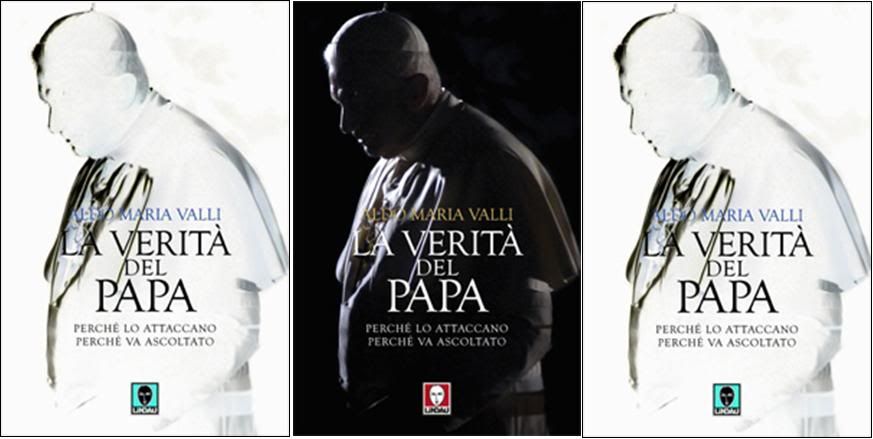
In a new book, Valli goes back over the most significant episodes of the past five years of this Pontificate which has always been attended by fierce controversy:
- The Regensburg lecture which unleashed anger in the Muslim world [But not 'sustained' anger, it must be noted, compared to that of MSM - there have been no anti-Church initiatives from Islamic leaders since Regensburg, although anti-Christian attacks by Islamic extremists continue to occur, but those have nothing to do with what the Pope has said.]
- Lifting the excommunication of four Lefebvrian bishops, including a Holocaust 'negationist', inciting harsh criticism from Jews and progressive Catholics.
- Benedict's 'heresy' in saying condoms are not the solution to the AIDS pandemic, which some European governments formally protested.
- The 'perfect storm' represented by the priest pedophile issue which has scandalized everyone. [One must take exception to that statement as being exaggerated and sanctimonious. The 'scandal' professed by MSM and their likeminded cohort is very much like that of Claude Rains in the movie Casablanca ('I am shocked! - shocked to find that gambling goes on here"). The terrible crime of priest pedophilia had already been ventilated, scrutinized, analyzed to death, and denounced to high heavens for almost two years when the first issue first became public fodder in 2000-2002. All the fresh indignation in 2010 in the wake of public disclosures in some European countries was more grandstand play to demonize the Catholic Church rather than genuine sentiment!]
Not to mention other emblematic episodes such as the cancelled visit to Rome's La Sapienza University in 2009 resulting from militant ostracism by a very tiny group of professors and students [67 professors and a few hundred leftist students, in a university with a faculty of more than 2,000, and a student population of at least 40,000.]
In this brilliant work of popular apologetics, Valli explains that there are two main reasons, in effect, for this systematic aggressiveness against Papa Ratzinger:
"Because he says that truth exists, and because he calls for social justice" thus obstructing "the maneuvers of those who tout moral relativism and social injustice".
He does not believe there is a conspiracy [Only conspiracy-obsessed extremists even think that!] - it's futile, he says, to imagine some 'grand old man' orchestrating denigratory campaigns; rather there are certain converging interests.
He prefers to think that this Pope irritates progressivist Catholics - especially those "paladins of the 'Church from below' who are working zealously to make people believe that underneath the dome of St. Peter's, there is nothing but rottenness" in the name of spirituality.
Valli, who certainly cannot be considered a traditionalist, strikes hard at that Catholic constituency which is more willing to tolerate the world than to bear witness to their faith before it:
At times, one has the impression that there exists a Stockholm syndrome relationship between these Catholics and the world. Instead of using reason to unmask the enemy and neutralize them/him/it with the truth, these Catholics in fact show admiration if not outright love for 'the world' and what it thinks and does [as opposed to what the Church teaches].
This is due in large part to a mixture of ignorance and bare awareness of their own Catholic patrimony, which they express in a lethal inferiority complex.
Benedict XVI does not stand for nor tolerate any such complex. That is why he is their target.
First, I am surprised - and thankful - that Valli has come out with this 'defense' of Benedict. His commentaries for RAI have not always been friendly to the Pope, and perhaps his background explains it. He was a follower of Cardinal Carlo Maria Martini when the latter was Archbishop of Milan. Valli (born 1958) is a facile writer who has authored as many as 19 books of reportage, including 5 on John Paul II, and this year, besides this book, he has also published an interview-book with Hans Kueng entitled Ribelle d'amore. Last year, he came out with a book about the Milan episcopal work of Cardinal Dionigi Tettamanzi, who succeeded not just to Martini's post in Milan but also inherited his liberal mantle.
[Modificato da TERESA BENEDETTA 10/11/2010 20:44] |
| |
|
| |
 09/11/2010 13:10 09/11/2010 13:10 |
|
| | | OFFLINE | | Post: 21.405
Post: 4.041 | Registrato il: 28/08/2005
Registrato il: 20/01/2009 | Administratore | Utente Master | |
|

 The website of the Italian bishops' conference CEI has made available the message of the Holy Father, who is also Primate of Italy, to the autumn general assembly of the Italian bishops, which opened Monday afternoon in Assisi. A translation follows.
The website of the Italian bishops' conference CEI has made available the message of the Holy Father, who is also Primate of Italy, to the autumn general assembly of the Italian bishops, which opened Monday afternoon in Assisi. A translation follows.
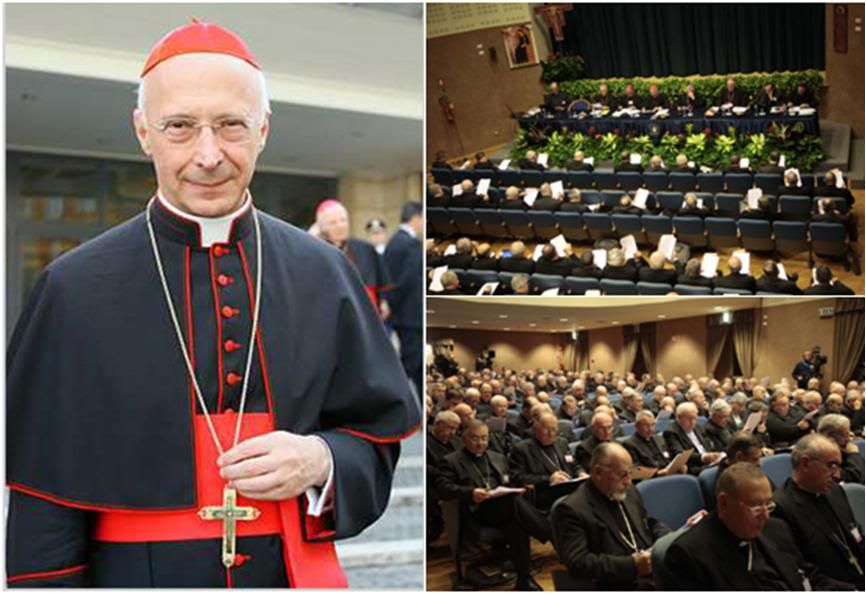
Cardinal Angelo Bagnasco delivered the opening statement, which the 11/9/10 issue of OR carries in full (so it is strange it does not also carry the Holy Father's message).
The message is no ordinary 'best wishes, hope your work turns out well' - it is, in fact, an unusual message that focuses on the importance of liturgy, and leads up to it by citing the attitude that St. Francis always had towards the Eucharist (the latest of Benedict XVI's frequent references to St. Francis), and from there, to the new Italian translation of the Roman Missal which the assembly will examine and put to a vote. It is an eloquent message, at times poetic, that ties in somehow with the Pope's homily at Sagrada Familia... and another powerful message for priests and bishops.
MESSAGE OF THE HOLY FATHER
to the 62nd GENERAL ASSEMBLY
OF THE ITALIAN BISHOPS CONFERENCE IN ASSISI
To my Venerated Brother
Cardinal Angelo Bagnasco
President of the Italian Bishops' Conference
With this message that I send you on the occasion of the General Assembly of the Italian bishops' conference, I make a spiritual pilgrimage to Assisi to be with you and personally reach out to you and to each of the bishops gathered - caring pastors of the beloved local churches in Italy.
Your concern and commitment are manifested in the responsible governance of the dioceses in paternal closeness to your priests and parish communities. An eloquent sign is your attention to the subject of education that you have taken on as a priority in the decade to come.
The Pastoral Orientations of the Church of Italy (2011-2020) published recently are an expression of a Church that, in the school of Jesus Christ, is taking to heart the life of every man, and to this end, "seeks in daily experience the alphabet to make up the words with which to present God's infinite love to the world" (Educare alla vita buona del Vangelo, 3).
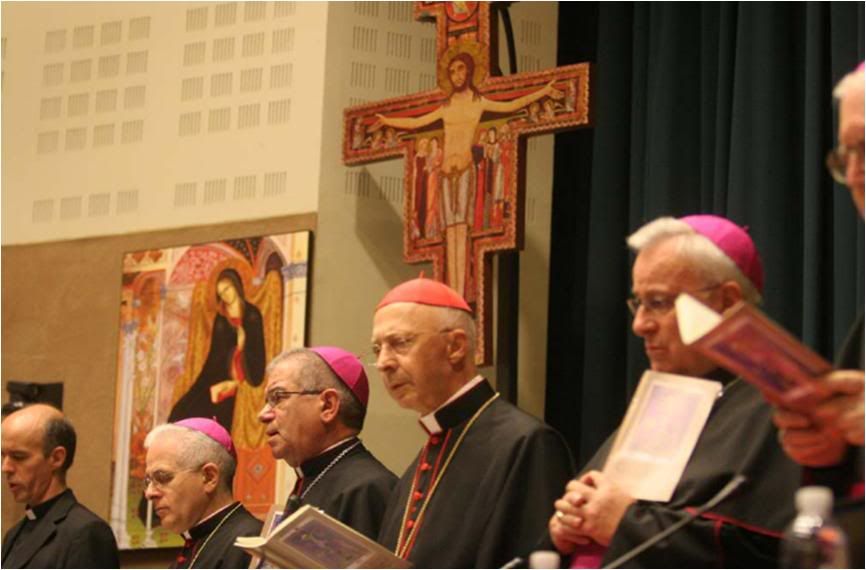
These days, you are meeting in Assisi, the city in which 'a sun was born to the world' (Dante, Paradiso, Canto XI), who was proclaimed by the Venerable Pius XII as Patron of Italy: St. Francis, who preserves intact his freshness and his relevance - saints never fade - because he had conformed himself totally to Christ, of whom he was a living icon.
As in our day, even the time when Francis lived was marked by profound cultural transformations, favored by the birth of the university, the development of civilian communities, and the dissemination of new religious experiences.
Precisely at that time, thanks to the work of Pope Innocent III - the same Pope from whom the Poverello of Assisi had obtained canonical recognition [for his order] - the Church was undertaking profound liturgical reform.
It was the eminent expression of the IV Lateran Council (1215), which lists among its fruits the Breviary. This book of prayers gathered together the wealth of theological reflection and prayerful experiences of the preceding millennium.
Adopting it, St. Francis and his brothers made the Supreme Pontiff's liturgical prayer their own. It was in this way that the saint listened to the Word of God and meditated on it assiduously, to the point of carrying it over into the prayers that he himself wrote, and in general, to all his writings.
The IV Lateran Council, with particular attention to the Sacrament of the Mass, inserted the term 'trans-substantiation' into the profession of faith [the Credo], in order to affirm the real presence of Christ in the Eucharistic Sacrifice: "His Body and Blood are truly contained in the Sacrament on the altar, in the form of bread and wine, as the bread is trans-substantiated into his Body and the wine to his Blood through divine power" (DS, 803).
St. Francis's evangelical life and his vocation to retrace the way of the Crucified Christ arose from attending daily Mass and receiving Holy Communion with great devotion: "The Lord," we read in his Testament of 1226, "gave me such faith in the church that I simply prayed and said, 'We adore you, Lord Jesus, in all the churches that are in the whole world and we bless you because with the Holy Cross, you redeemed the world'." (Fonti Francescane, n. 111).
This experience was also the origin of the great deference that he had for priests and his admonition to his friars to respect them always, "because what I corporally see in this world of the Most High Son of God is his Most Blessed Body and Blood that only they can consecrate and administer to others" (Fonti Francescane, n. 113).
In the face of such a gift, dear brothers, what a great responsibility in life it means for each of us! "Look after your task, brother priests," Francis urged, "and you will be holy because he is holy (Letter to the Chapter General and to all the Brothers, Fonti Francescane, n. 220)!
Yes, the sacredness of the Eucharist demands that this Mystery be celebrated and adored with full awareness of its grandeur, importance adn efficacy for Christian life, but it also demands purity, consistency and a holy life in each of us so that we may be living witnesses of Christ's unique sacrifice of love.
The saint of Assisi never stopped contemplating how "The Lord of the universe, God and Son of God, so humble as to hide himself, for our salvation, in the humble form of bread" (ibid., n. 221), and he vehemently called on his friars: "I pray you, more than doing it for me, whenever it is appropriate and you consider it necessary, to humbly ask of priests that they may venerate above every other the Most Holy Body and Blood of our Lord Jesus Christ and the holy words written by him that consecrate the body" (Letter to all Franciscan custodians, Fonti Francescane, n. 241).
2. The authentic believer, in every time, experiences in the liturgy the presence, the primacy and the work of God. Liturgy is veritatis splendor - the splendor of truth (Sacramentum caritatis, 35), a nuptial event, a foretaste of the new and definitive city, and participation in it.
It links creation and redemption, a heaven open to the earth of men, a passage from the world to God. It is Easter, in the Cross and Resurrection of Jesus Christ. It is the soul of Christian life, called to follow him - a reconciliation that moves us to fraternal charity.
Dear brothers in the Episcopate, your gathering will center on examining the Italian tradition of the third typical edition of the Roman Missal. The correspondence of the prayers of the Church (lex orandi) to the rules of faith (lex credenti) shapes the thought and sentiments of the Christian community, giving form to the church, Body of Christ and temple of the Spirit.
Every human word cannot be separated from its time, even when, as in liturgy, it constitutes a window that opens up to what is beyond time. To give voice to a reality that is perennially valid thus demands a wise equilibrium between continuity and novelty, tradition and the present. The Missal itself fits within this process.
Every true reformer is, in fact, someone who obeys the faith - he does not move arbitrarily, nor should he arrogate upon himself any discretion about the rite. He is not the master but the guardian of the treasure instituted by the Lord and entrusted to us. The entire Church is present in every liturgy - to adhere to its form is a condition for the authenticity of he who celebrates it.
3. May these reasons urge you, in the changing conditions of the times, to make more apparent and practicable that very faith which goes back to the time of the nascent Church.
It is a task that is even more urgent in a culture which, as you yourselves have highlighted - has seen "the eclipse of the sense of God and [of man] being lost in the dimension of interiority, the uncertain formation of personal identity in a pluralistic and fragmented context, the difficulty of dialog among generations, the separation between intelligence and affectivity" (Educare alla vita buona del Vangelo, 9).
These elements are the sign of a crisis of confidence in life ,and have a relevant influence on the educational process, in which reliable criteria have become labile.
Contemporary man has invested much effort in the development of science and technology, achieving in these fields goals that are definitely significant and appreciable. Nonetheless, such progress has often come at the cost of the foundations of Christianity, in which the fecund history of the European continent is rooted.
The moral sphere has been limited to the subjective, and God, when he is not denied, is otherwise excluded from public consciousness. And yet, a person grows to the degree that he experiences goodness and learns to distinguish ti from evil, beyond that calculation that only considers the consequences of a single action or which uses as criterion for judgment the possibility of achieving something.
To preserve that, a generic appeal to values does not suffice, nor an educational proposal that is satisfied with purely functional and fragmentary interventions. There is a need, instead, for a personal relationship of fidelity among the active subjects, the protagonists in the relationship, each capable of taking a position and putting his own freedom in play (cfr ibid., 26).
For this reason, your decision is more than ever timely to rally all those who have at heart the city of man and the good of the new generations, to their responsibility for education.
Such an indispensable alliance can only start from a new proximity to the family, recognizing and supporting its educational primacy - the face of a people is shaped within the family.
As the Church in Italy, attentive to interpreting what is happening in the world today, and therefore, of grasping the questions and desires of man, you must renew this commitment and work willingly to listen and to dialog, placing the good news of God's paternal love at the disposition of everyone.
You must be inspired by the certainty that "Jesus Christ is the way who leads everyone to the full realization of himself according to God's design. He is the truth who reveals man to himself and leads him along the way of growth in freedom. He is life, because in him, every man finds the ultimate meaning of his existence and his function - full communion of love with God in eternity" (ibid., n. 19).
4. In this undertaking, I exhort you to value the liturgy as a perennial source of education in tthe good life of the Gospel. It introduces one to an encounter with Jesus Christ, who with words and acts constantly edifies the Church, shaping it in the profundity of listening, of fraternity, and of mission. Rites speak powerfully of their intrinsic rationality and communicability, and educate us for conscious, active and fruitful participation (cfr Sacrosanctum Concilium, n. 11).
Dear friends, let us raise our heads and look into the eyes of Christ, our only Teacher, the Redeemer from whom comes every responsibility we have to the communities that are entrusted to us and to every man.
May the Most Blessed Mary, with her maternal heart, watch over our journey and accompany us with her intercession. In renewing my affectionate closeness to you and my brotherly encouragement, I impart the Apostolic Blessing from the heart to you, Venerated Brother, to the Bishops, to your co-workers and to all who are present.
From the Vatican
Nov. 4, 2010

P.S. The Vatican Press Office posted the Holy Father's message today in its daily bulletin.
[Modificato da TERESA BENEDETTA 12/11/2010 12:21] |
| |
 09/11/2010 14:14 09/11/2010 14:14 |
|
| | | OFFLINE | | Post: 21.406
Post: 4.042 | Registrato il: 28/08/2005
Registrato il: 20/01/2009 | Administratore | Utente Master | |
|
 Nov. 9, Tuesday, 32nd Week in Ordinary Time
Nov. 9, Tuesday, 32nd Week in Ordinary Time
 The facade; the baldachin over the main altar; and the Cathedra.
FEAST OF THE DEDICATION OF THE LATERAN CATHEDRAL
The facade; the baldachin over the main altar; and the Cathedra.
FEAST OF THE DEDICATION OF THE LATERAN CATHEDRAL
'Sacrosancta Lateranensis ecclesia omnium urbis et orbis ecclesiarum mater et caput'
[Most Holy Lateran Church, of all the churches in the city and the world, the mother and head.]
Dedicated to John the Baptist and John the Evangelist, the Basilica of San Giovanni in Laterano is the Cathedral church of Rome,
the seat of the Bishop of Rome. Its official name is Archibasilica Sanctissimi Salvatoris(Archbasilica of the Most Holy Saviour).
The present building was built in 1646 on the site of a 4th-century church built by Constantine. It is the oldest among the four
major basilicas of Rome, and as the seat of the Bishop of Rome, it may be considered the parish church of all the world's Catholics.*
OR for 11/8-11/9/10:
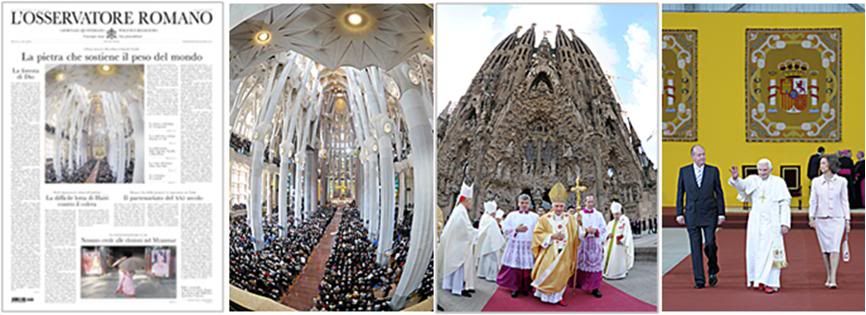
The Pope consecrates the Basilica of La Sagrada Familia in Barcelona
and meditates on Christ as
'The stone that sustains the weight of the world'

 In this issue, the OR completes its coverage of the Holy Father's weekend visit to Spain, with an editorial on 'The forest of God', and texts and reportage on the Mass to commemorate the Holy Year of St James in Compostela; the Mass, dedication rite and Angelus at Sagrada Familia in Barcelona; his visit to the Nen Deu Institute; and his departure from Spain, where he had a brief meetign at the airport with Prime Minister Zapatero, and was seen off by the King and Queen, as well as the transcript of the news conference he gave on the flight to Compostela on Saturday morning. Page 1 international news: Obama in India seeks a partnership for the 21st century; international observers do not believe Myanmar's recent election was valid; and Haiti continues to battle a cholera epidemic that has now claimed more than 500 lives. In the inside pages, the opening address by Cardinal Angelo Bagnasco to the autumn General Assembly of teh Italian bishops; adn two articles on the Vatican Library and Archive which recently re-opened to the public after three years of restoration, with a special exhibit on the Library at the Charlemagne Arm of the Bernini Colonnade on St. Peter's Square.
In this issue, the OR completes its coverage of the Holy Father's weekend visit to Spain, with an editorial on 'The forest of God', and texts and reportage on the Mass to commemorate the Holy Year of St James in Compostela; the Mass, dedication rite and Angelus at Sagrada Familia in Barcelona; his visit to the Nen Deu Institute; and his departure from Spain, where he had a brief meetign at the airport with Prime Minister Zapatero, and was seen off by the King and Queen, as well as the transcript of the news conference he gave on the flight to Compostela on Saturday morning. Page 1 international news: Obama in India seeks a partnership for the 21st century; international observers do not believe Myanmar's recent election was valid; and Haiti continues to battle a cholera epidemic that has now claimed more than 500 lives. In the inside pages, the opening address by Cardinal Angelo Bagnasco to the autumn General Assembly of teh Italian bishops; adn two articles on the Vatican Library and Archive which recently re-opened to the public after three years of restoration, with a special exhibit on the Library at the Charlemagne Arm of the Bernini Colonnade on St. Peter's Square.
No events scheduled for the Holy Father today.
The Vatican has posted the text of the Holy Father's message to the current General Assembly of the Italian bishops in Assisi.
And an important announcement from the Council for Promoting Christian Unity:
To commemorate the 50th anniversary
of the Council for Christian Unity

At 5 p.m. on Wednesday 17 November, at the Sala San Pio X, at Via della Conciliazione 5, Rome, the Pontifical Council for Promoting Christian Unity will hold a public commemoration to celebrate the fiftieth anniversary of the founding of the Secretariat for Promoting Christian Unity.
The event will be presided by Archbishop Kurt Koch, president of the Pontifical Council for Promoting Christian Unity, and will be attended by Cardinal Walter Kasper, president emeritus, His Grace Rowan Williams, archbishop of Canterbury, and His Eminence Metropolitan Pergamo Ioannis (Zizioulas) of the Ecumenical Patriarchate of Constantinople.
On 5 June 1960, the day of Pentecost, with his Motu Proprio «Superno Dei Nutu», Blessed John XXIII established, along with the eleven preparatory commissions for Vatican Council II, a Secretariat for Promoting Christian Unity.
The first president to whom Pope John XXIII entrusted responsibility for the Secretariat was Cardinal Agostino Bea, succeeded by Cardinal Johann Willebrands, Cardinal Edward Idris Cassidy, Cardinal Walter Kasper and, as of 1 July 2010, Archbishop Kurt Koch.
In 1988 Pope John Paul II, with his Apostolic Constitution «Pastor Bonus», changed the name of the Secretariat to that of the Pontifical Council for Promoting Christian Unity.
Over the course of the years, the Pontifical Council for Promoting Christian Unity has administered relations with the vast world of ecumenism, both at a multilateral level and through bilateral contacts and dialogue with many Churches and Christian communities.
The date for the commemorative celebrations was deliberately chosen to coincide with the plenary session of the Pontifical Council for Promoting Christian Unity, which will be held from 15 to 19 November and will focus on the theme: «Towards a new stage of ecumenical dialogue».
This review of the past, focusing on the moment of foundation and on the road travelled thus far, will provide an occasion to give thanks to God for those people who have helped to advance the cause of ecumenism, and for the abundant fruits that have been produced.
It will likewise help to arouse renewed interest in the cause of unity and underline the firm resolve to continue the journey towards the full communion of all Christians, confidently facing the new challenges that arise.
[Modificato da TERESA BENEDETTA 09/11/2010 14:20] |
| |
 09/11/2010 17:38 09/11/2010 17:38 |
|
| | | OFFLINE | | Post: 21.407
Post: 4.043 | Registrato il: 28/08/2005
Registrato il: 20/01/2009 | Administratore | Utente Master | |
|
 God's forest
God's forest
Editorial
by Giovanni Maria Vian
Translated from the 11/8-11/9/10 issue of

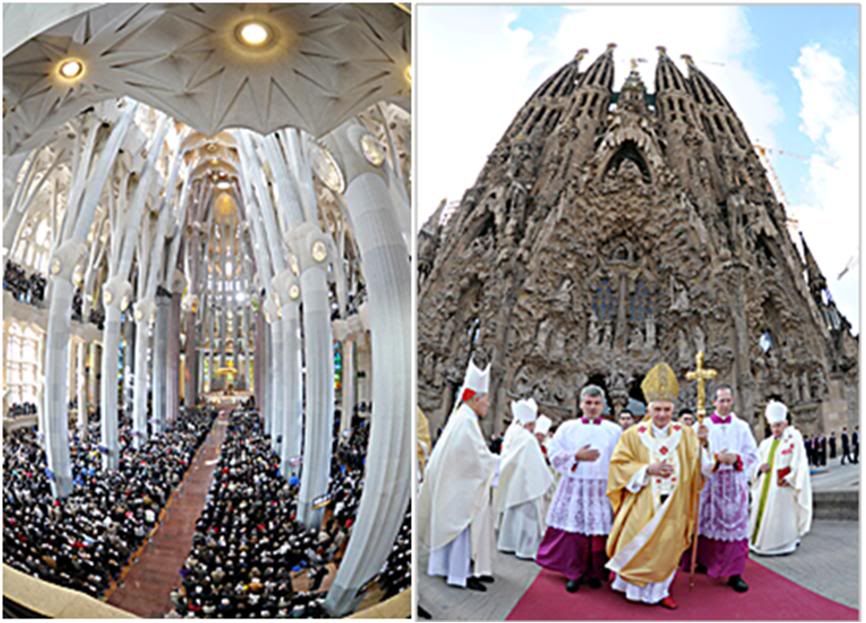
Benedict XVI's second visit to Spain in five years was a historic trip for its importance and symbolic for its significance. By visiting two cities which confretely express the diversified reality in a hreat nation that is strongly rooted in the Christian tradition [More than just generically Christian, Spanish tradition and religiosity have always been very specifically and floridly Catholic], and although largely secularized, welcomed the Pope with sympathy and listening to him attentively.
A sympathy and attention demonstrated publicly by the King and Queen of Spain, by the Princes of Asturias, by the President of the government (the Prime Minister), and by national and regional authorities. Of course, in addition to the Church which has confirmed itself to be a vital and lively presence in Spanish society.
The Roman Pontiff's itinerary, touching down at Santiago de Compostela and in Barcelona [from the eastern part of Spain to its western coast], symbolically traces the history of the nation and supports Spain's openness not just to all of Europe but also to the rest of the world.
Speaking to the Spanish people - and to the rest of the world - the Pope underscored above all the significance of the Christian faith, which did not arise as a human project but from God himself who lives within the heart of every man.
It is a tragedy, Benedict XVI said, in his homily in Santiago, in front of its wondrous Romanesque-Baroque cathedral, that on the European continent, especially during the 19th century, the idea that God is an antagonist to man and an enemy of his freedom could have been disseminated.
In the face of this almost incomprehensible denial of God, he said, it is necessary that God, 'the sun of intelligence', returns to the skies over Europe, a continent that in its turn should open herself to transcendence.
Just as the image of the crucified Christ is found as a marker along the ways that lead to Compostela - where the memory of the Apostle James has lived on for more than a millennium - so should 'the blessed Cross shine again in European lands to 'the glory of man', Benedict XVI said, expressing the wish that the Europe of culture and science would also open up to transcendence.
This openness to God was mentioned once more by Benedict XVI in Barcelona when he consecrated the expiatory temple born from the genius of Antoni Gaudi, and during his visit to give a tender embrace to children and youths in care of Nen Deu, the institution named for the Child Jesus, and to encourage those who do such charitable work.
The immense mass of stone that is the Sagrada Familia church - almost like a magic forest of columns that can seem to be in motion, was defined by the Pope as a sacramental reality, "a visible sign of the invisible God, to whose glory these spires rise like arrows pointing towards absolute light and to the One who is Light, Height and Beauty itself"
God's sanctuary, as every human heart is. And so, it is sacred, and therefore the Church, founded by and on Christ - not out of hostility to man and his freedom - hopes for measures to support the family and opposes every form of rejecting human life.
With this visit to Spain, the Successor of Peter has once again clearly demonstrated the meaning of the path he has chosen and that of the Church: to present God to the world, God who is man's friend and who invites us to his home.
A home whose beauty is merely foreshadowed by the Portico of Glory that welcomes the pilgrims who arrive in Compostela, and in Barcelona, by that forest of God that Gaudi - visionary artist and authentic Christian - specifically wished to arise from the center of a city of men....
So that they may see his presence among them, contemplate his inexpressible wonder, and learn how to accept him.
The Holy Father's two major discourses in Spain - both homilies - were very rich, dense with multiple significances and resonances, but in a way that was completely different from the powerful major speeches and homilies he delivered in the United Kingdom. The Pope's major texts always leave me in awe at the near-infinite ways he has of delivering the message of Christ - eloquently and elegantly - and how it applies to specific situations that reflect the universal human condition. Most commentaries, even the most favorable, on the substance of his texts can only pale beside what he says and how he says it.
This is one of the best commentaries I have read about the visit so far - because it is more than just about the visit...
Benedict XVI shatters pre-conceptions:
The future of the faith
must pass through Spain
Editorial
by Lucio Brunelli
Translated from

Nov. 9, 2010
The Pope in Zapatero's Spain. And the army of the media ready to file the visit under the category of a Church reduced to the trenches, in a perennial war against the 'enemy', modernity.
But again, the Pope himself shattered their preconceived notions. Starting with his in-flight meeting with newsmen, he spoke of an encounter, not a clash, with secularism, [In Italian, it sounds better, because it is 'scontro' versus 'incontro'.]
And though it is a 'tragedy' that contemporary man perceives God as 'an antagonist to his freedom', it would have been useless to lose time in recrimination or denunciation. Rather, what is needed is authentic witness to the Christian faith in order "to hear God once again under the skies of Europe".
It was a visit that was in no way 'reactive'. and it was focused on two simple acts. The pilgrimage to Santiago de Compostela and the consecration of the Sagrada Familia in Barcelona.
It was said when his pontificate began that Benedict XVI would be a Pope of words, where John Paul II was a Pope of 'gestures', that he would be a Pope to 'read' and not one to see. But this simplistic scheme seems, after five and a half years, inappropriate and worn out.
Papa Ratzinger cannot be appreciated if one does not see how he celebrates the liturgy and how he prays, the way he knelt, for example, on Saturday, in front of the tomb of the Apostle James.
It is impossible to separate his judgments, even those that are most sharply delineated, from the gentleness and serenity of his look. We saw it even in the less official moments of this visit to Spain: the look of wonder, almost childlike, with which he followed the breathtakingly perilous swinging of the famous giant censer in the cathedral of Santiago. And his look of enchantment as he appreciated the beauty of the Sagrada Familia in Barcelona at the Dedication Mass. [It truly is extraordinary to see that childlike wonder in an 83-year-old - as when he looks at the Nativity scene in St. Peter's or any creche, for that matter.]
Professor Ratzinger is well and truly all Pope. And the first to know this are the regular folk who instinctively like him and wish him well. From his presence and from his teaching, they seem to feel truly confirmed and encouraged in the simplicity of their faith.
It used to be, in ecclesiastical circles, that 'Ratzingerian' was taken to mean to be always and only 'against' - to be hardline and purist, grim and forbidding. The risk was that such prelates resembled and soon started to assume all the tics and neuroses of their 'enemy', the so-called 'progressivist Catholics' or the 'secularists".
But even in this respect, Benedict XVI shatters such notions. We saw it in his trip the United Kingdom, And once again on this visit to Spain. He is not a Pope 'against' anyone - he is a Pope who communicates positiveness and in a very human way.
He wishes to speak to man today, to each of us. He sincerely desires that we should understand and experience Christianity not as a 'minus' but as a 'plus' for our humanity.
It is a humble but joyous announcement, because of the awareness that ultimately, its success depends not on our arguments or our activism - rather, that it is a grace of God, as he once again reminded us in his homily at the Sagrada Familia:
From him the Church receives her life, her teaching and her mission. The Church by and of herself is nothing; she is called to be the sign and instrument of Christ, in pure obedience to his authority and in total service to his mandate. The one Christ is the foundation of the one Church. He is the rock on which our faith is built. Building on this faith, let us strive together to show the world the face of God who is love and the only one who can respond to our yearning for fulfilment.
Here's an evaluation of the visit by someone who was very much involved in the organized effort by the bishops of England and Wales to counteract the fierce anti-Pope propaganda that proliferated in the UK media before the Pope's visit there. He was apparently in Spain, at least for the Sagrada Familia consecration....
The Pope in Spain:
Was it a success?
by Austen Ivereigh
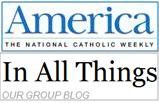
Nov. 9, 2010
Judging the success of a papal visit is never a scientific exercise. But there are certain criteria: was the Pope listened to, or ignored? Did people turn out? Did the media give it good coverage? Did words and actions go together? Were there moments which made people sit up?
Some visits, however wonderful for those taking part, get obscured by particular stories which dominate the headlines and marginalize the deeper message - -as happened in 2008 when the Pope made comments on the papal plane on AIDS and condoms which drowned out any further reporting of the trip.
This time, it was Pope Benedict's comments on the papal plane linking modern-day Spanish secularism and anticlericalism to the 1930s which threatened for a while to derail the trip. Many on the left reacted furiously, as did secularists in the UK when Pope Benedict's Edinburgh speech lumped together atheism and Nazism. [I am surprised Ivereigh himself falls into the trap that the secular MSM did by this misrepresentation of what the Pope actually said!]
But unlike in the UK, where the furious reaction wasn't taken up by the newspapers, the Madrid daily El Pais, the mouthpiece of the left-liberal establishment, and El Publico, saw it as insult, one that was both historically inaccurate (6,000 priests and religious were killed in the civil war, and countless churches torched) and one-sided (because it failed to acknowledge the Church's errors).
Yet what the Pope in fact said was that Spain saw the birth of "a strong and aggressive secularism such as that of the 1930s" and that "this dispute, this clash between faith and modernity, both very lively, is coming about again in Spain today", before going to call for an "encounter" between faith and secularism to resolve misunderstandings. It was clear that Benedict XVI was referring to the shadows of the past which still hang over the present -- which nobody would dispute.
But whereas in the UK, the Pope's messages and actions made a powerful case against the exclusion of faith from public life by demonstrating that the Church had much to contribute to it, in Spain Benedict XVI didn't manage to persuade the children of the Franco era to reconsider.
[Perhaps not the hidebound ultra-reactionary liberals of El Pais and their ilk, who will go to their graves as rabid anti-clericalists! But who's Ivereigh to say what its effect may have been on regular folk who have not necessarily swallowed the ultra-reactionary line as if they were nothing but robots? The million-man marches that the Church in Spain has mobilized yearly to demonstrate in defense of life are all composed of 'Franco-era children' too. And from the accounts I have read in the Spanish press of the 300,00 who did show up in Barcelona for the Pope, the majority were of teh below-25 generation!]
He made the usual eloquent and passionate argument in favour of the need to reconcile faith and reason, truth and freedom, modernity and morality, in elegant, direct texts, but steered clear of addressing some of the historic causes of that alienation.
No doubt, there was only so much he could do in two Masses, and there was more than enough to tackle in the themes of pilgrimage, faith, the Christian origins of Europe, God and beauty, the sanctity of life, and so on. He was there too briefly, it could be argued, to start up a passionate debate about the Church's historical record.
But while it lifted the pros, it didn't shift the antis.
The Church was happy with the turnouts. As happened in the UK, the contemporary European obsession with security has to a large extent killed off the spontaneous crowds of the John Paul II era.
Going to the Sagrada Familia, it was extraordinary to see a policeman every two feet stretching for miles down streets which, again for security reasons, the Popemobile sped along at 20 miles an hour. Just as in the UK, the way the Church now organises attendance for the events -- each parish is allocated tickets, and has to organize a coach to be bussed in -- meant that the crowds were far smaller than in the previous pontificate. Hotels in Santiago de Compostela and Barcelona were at 70-80% capacity, more than usual for November, but far lower than in the summer season.
That said, Barcelona managed a highly respectable 250,000 spontaneous turnout -- similar to that which came out for Benedict XVI in London.
The greatest success of the visit was visual -- a display of the power of Catholic liturgy in two of the world's most iconic cathedrals. Few places of worship can match the botafumeiro in Santiago de Compostela, or Gaudi's dazzling modern masterpiece in Barcelona.
The Sagrada Familia liturgy was a rare spectacle followed by millions on television -- one in four Spaniards, estimate today's papers -- assisted by the Catalan television station TV3's spidercam, which swooped and soared through the basilica (from where I was sitting, it was a wonder to behold), giving an angel's eye view.
And in Barcelona, the tone was set by its highly-esteemed daily, La Vanguardia, whose editor -- I was told -- had observed the UK papal trip and learned from it: he knew this was a once-in-a-lifetime, heaven-sent chance to register the city in the consciousness of the world. The newspaper's coverage was respectful, phenomenally detailed, and scornful of what it saw as the petty-mindedness of the protesters. [I saw its headlines which give an idea of the variety of its coverage - too bad I can't breach its online paywall, and will have to wait till they surface on the online religious journals!]
That left the secularists looking like a powerless, disgruntled minority. An anti-Pope protest of 2,000 -- with bizarrely ideological slogans such as "No to the Church and the state" -- and a gay "kiss-in" were made to look bad-tempered and ill-judged. [It was, of course, the pre-visit demo by 2000, and the 'kiss-in' by 100 gay couples that the Anglophone media reported - not the 300,000 who were in Compostela, and the 300,000 in Barcelona.]
By leaving Spain, preferring to visit troops in Afghanistan, the prime minister, Jose Luis Rodriguez Zapatero, was also made to look sectarian and un-presidential, giving the main platform to Spain's royal family.
By reinforcing stereotypes of socialist anticlerical state versus Catholic monarchy, Zapatero came off looking small-minded in comparison to the Catalan politicians of all stripes who made sure they were in the Sagrada Familia for this historical cultural moment. [That he chose to travel to Afghanistan so that he would return to Spain way after the Sagrada Familia Mass was over, was a most clumsy way to give himself an alibi not to attend an event that was historic for all of Spain, and not just for Catholicism! It's hard to understand how Fidel and Raul Castro in Cuba have not been hesitant nor embarrassed to attend important Masses since John Paul II visited Cuba, but Zapatero, who was baptized Catholic and is socialist not Communist, cannot even bear to be seen attending a papal Mass! To think that he and Benedict XVI share the same baptismal names - Jose Luis is Spanish for Joseph Alois.]
As in the UK, this was another success for Vatican diplomats. They squared off the government well in advance, and have lowered the temperature of Church-state conflict over the heads of the Spanish bishops' conference.
But the greatest achievement of the papal visit was to heal the wounds left by Pope John Paul II's visit to Barcelona in 1982, when he made the fatal mistake of addressing Catalans without mentioning their nationality, using the same phrase with which Franco addressed them, as "Barcelonians". [An interesting historical fact that I have not read elsewhere... But it is hard to imagine how the Vatican could have overlooked that most significant detail, when Catalan touchiness and fierce pride in their 'national identity' being distinct from the rest of Castilian Spain is legendary. In this, Catalunya is very much like the two other autonomous regions of Spain, the Basque country and Galicia, which also have their own respective languages distinct from Castilian.]
That insult -- for which the Madrid bishops were responsible -- has lingered long in the Catalan Church, but has been amply compensated by Pope Benedict's warm words in Catalan, and his frequent mention of "this Catalan land".
Globally, that's not going to make much impact. But it has left Catalonia's 1-million Catholics feeling recognized, vindicated and more confident. [To say nothing of the number of Catalan men and women who have been proclaimed saints and blesseds in Benedict's Pontificate, so far!]
In that sense Pope Benedict XVI's Spanish trip, like his UK visit, has been a huge success in encouraging Catholics to step up and be counted.
By reminding Spain of the glories of the Church and its vital place in their nation, he may have gently helped to roll back the secularist tide. To the Catholic world at large, he has shown what it means to preside over an authentically sacred liturgy, in a setting of daring modernity [and yet, in full continuity with the tradition of the great cathedrals of Europe!].
In some senses, it's too early to evaluate, because last weekend should be seen as the first part of a two-part visit, the second stage of which takes place next August at World Youth Day in Madrid.
It may be then that the Vatican sees the major opportunity to heal the wounds left by the Civil War -- and put the Church at the centre of that historic reconciliation. If nothing else, this trip has been a perfectly executed curtain-raiser for that massive event.
[Modificato da TERESA BENEDETTA 10/11/2010 20:31] |
| |
 10/11/2010 02:25 10/11/2010 02:25 |
|
| | | OFFLINE | | Post: 21.408
Post: 4.044 | Registrato il: 28/08/2005
Registrato il: 20/01/2009 | Administratore | Utente Master | |
|
 The website of the Archdiocese of Barcelona has posted the text of Cardinal Martinez's words of welcome to the Holy Father before the Dedication Mass began on Sunday at the Sagrada Familia basilica. The address is both very informative and well said. Here is a translation.
Benedict XVI's providential role
The website of the Archdiocese of Barcelona has posted the text of Cardinal Martinez's words of welcome to the Holy Father before the Dedication Mass began on Sunday at the Sagrada Familia basilica. The address is both very informative and well said. Here is a translation.
Benedict XVI's providential role
in the history of Sagrada Familia
Welcome remarks by
Cardinal Lluis Martinez Sistach
Archbishop of Barcelona
November 7, 2010
Translated from

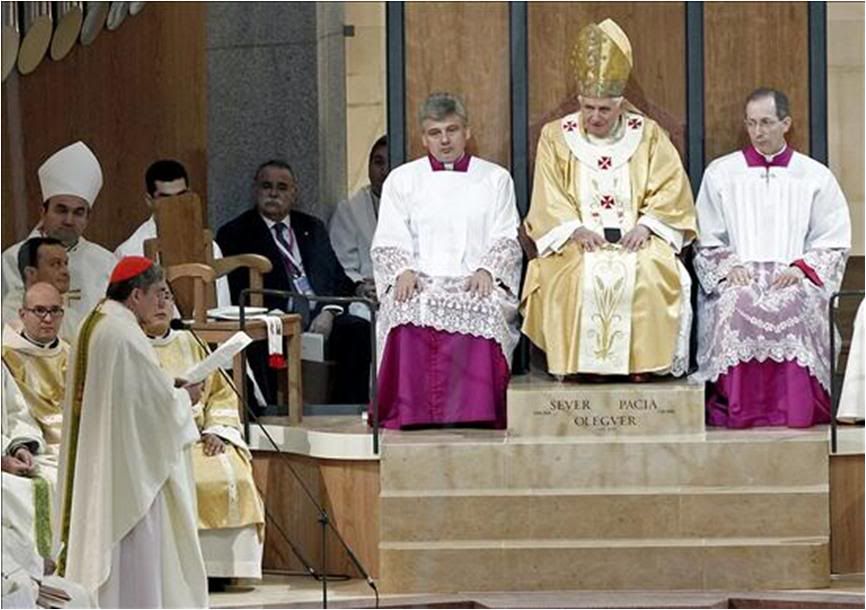
Holy Father, welcome among us. Welcome to this city and Church of Barcelona who welcome you with filial affection and with a thankful heart. Your apostolic concern for all the Churches led you to accept to preside at the dedication to God of this temple of the Holy Family.
The Christian people of our land thank you for this and wished to respond with a most hearty welcome and constant prayer that the Lord help and comfort you in the exercise of your ministry as the Successor of the Apostle Peter in the service of the entire Church of Jesus Christ.
We have awaited your apostolic visit with joy and we have prepared for it with prayer, with catecheses on the ministry that the Lord has entrusted to you, and solidarity with those who have most suffered the effects of the economic crisis.
We look forward to hear the words that, as 'the sweet Christ on earth', you will address to us to confirm us in the faith and to revitalize our Christian identity. We expect many spiritual and pastoral fruits from your visit.
This great liturgical assembly presided by the Successor of Peter brings to reality the dream of the Servant of God Antonio Gaudi when he planned this temple. His dream arose from the prophetic visions of the Apocalypse, and his objective was that this temple would represent heaven on earth, the new Jerusalem come down to dwell in the midst of mankind, symbolized by the great metropolis of Barcelona.
Gaudi, with this construction that is brimming with beauty and symbology, wished that heaven would descend to earth and that the City of God would come to be the city of men, and consequently, that the city of men would become the city of God. The entire temple is an explanation of the Jerusalem announced in the prophecy of the visionary of Patmos {St John].
This wondrous work which began construction in 1882 with contributions from the Catalan people is an expression of their religious soul and their Christian roots that go back more than a thousand years. A people who love the temple of the Sagrada Familia for its religious adn artistic significance, who treasure Antonio Gaudi as an architect genius and exemplary Christian, and who are very content that today, presiding over us, Holy Father, this incomparable temple is being dedicated to the greater glory and praise of the Lord.
Many have contributed towards the eventual completion of this great milestone, besides the Asociacion de Devotos de San José, who sponsored the construction of the temple, from its principal creator, Antoni Gaudi, to the architects, artists, technicians and craftsmen, and all the members of the patronate of the Junta Constructora de la Sagrada Familia, with their work, competence and generosity.
From today, this church - which at the end of the celebration you will declare a basilica - wlll be dedicated to liturgical worship and will continue to welcome millions of persons from around the world to offer them this beautiful space for celebrating the faith, for prayer, for announcing the Word of God, and for reflection on the transcendent sense of life.
To the residents of the 'new Jerusalem', "the Lord shall give them light" (Ap 22,5). In the same way, the harmonious light of the temple of Sagrada Familia will work such that those who enter - many from the Court of the Gentiles - shall experience the warmth of God's glory.
Gaudi said that in the Sagrada Familia, everything was providential. We believe it is providential that Your Holiness is here today among us and that it is the Bishop of Rome and pastor of the universal Church who presides over the dedication of this temple which is unique in the world and has a clear universal significance.
In the face of difficulties, Gaudi used to say, "St. Joseph will complete the temple". We too consider it providential that for purposes of liturgical worship, this temple is complete today with this celebration by a Pope who carries the name Joseph as his baptismal name.
In the history of Catalunya, the ministry of the Bishop of Rome has always been very much present. In the profession of faith in our native language, since the 17th century, we profess our faith in the Catholic, apostolic and Roman Church. The history of the temple of Sagrada Familia honors this devotion to the Successor of St. Peter.
The parchment that was laid down with its first stone, on the Feast of St. Joseph in 1882, expressed profound communion with Pope Leo XIII. In 1957, on the occasion of the 75th anniversary of that cornerstone laying, the Junta Constructora of the temple was received in audience by Pope Pius XII, and today, it is 29 years since that November 7, 1982, when Pope John Paul II visited this church during his first apostolic visit to Spain.
Holiness, as heirs of the Christians who laid down the foundations for this admirable work, at the moment of dedicating it to God, we too wish to renew those sentiments of devotion and esteem to the Successor of Peter, and of communion with your person. which today carries the weight of service to all the Churches, as well as the defense of human dignity, of human life from its initiation to death, of matrimony and the family, of justice and peace in the world.
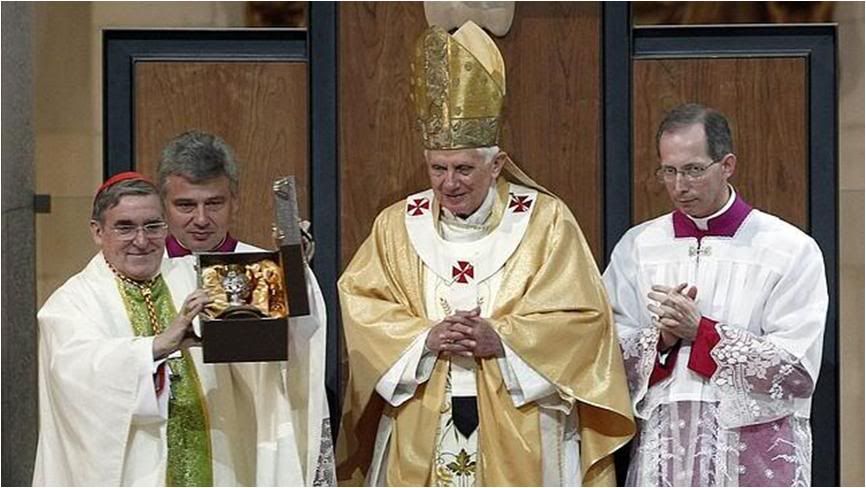 Cardinal Martinez shows the chalice given by the Pope to the church after his welcome remarks.
'The Pope's visit has revived
Cardinal Martinez shows the chalice given by the Pope to the church after his welcome remarks.
'The Pope's visit has revived
the self-esteem of the Catalan people'
Interview by Maria Paz Lopez
Translated from

Nov. 9, 2010
Cardinal Lluis Martinez Sistach, the man responsible for Benedict XVI's visit to Barcelona, says that the papal Mass at the now Basilica of the Sagrada Familia has projected to the world an image of a Catalunya with artistic and organizational merits, and has greatly amplified the worldwide fame of Gaudi's masterpiece.
The Archbishop of Barcelona regrets some criticisms, but notes that "Reducing faith to the personal or confining it to the sacristy is neitheer religious freedom nor authentic secularity" and also respects the decision of Prime Minister Zapatero not to attend the Mass, although "if he did, it would not have been a contradiction to having a secular State".
What remains of the visit?
We Catalans do not manifest our sentiments, but the welcome was warm. It was beautiful abnd right. The visit was historical for the city and for the diocese. Whenever I travel abroad, I am not asked about our Cathedral, which is a marvelous Gothic work, but about the Sagrada Familia. It is an icon of our city.
The Pope's visit had a pastoral dimension, if only because it was a cardinal who invited the Pope, not a politician. The purpose was ecclesial - to dedicate the Sagrada Familia - and was completed by his visit to the Nen Deu, where the families of disabled children were very moved by seeing him embrace them.
In Santiago de Compostela as well as in Barcelona, the Pope referred to secularism...
We have lost the spirit of the transition [from the Franco dictatorship to the present constitutional monarchy]... Then, there was more collaboration, there was an attempt to seek out what was positive on both sides, and each acknowledged the good that the other had done.
That has disappeared. Now the tendency is all secularist, and that is not positive. The state is secular, but society is not since it is composed of persons, many of whom have religion. The state is a-confessional but the Cosntitution itself proposes a secularity that is positive and open - in which persons as well as institutions and groups, have religious freedom. To reduce the faith to the personal or to confine it in the sacristy, is neithe religious freedom nor authentic secularity.
What should a government leader do witn resp[ect to a relgious ceremony of importance such as what took place in Santiago and Barcelona? Should they attend or not? Zapatero chose not to.
I respect the decision of people with public responsibility,and the Prime Minister had a chance to meet the Holy Father at the departure ceremony. But it is not a contradiction of the secular State if public officials who represent the citizenry take part in manfiestations that are cultural or religious or for sports events. Political leaders are at the service of society which is made up of various groups and sensibilities. The leader may not share their convictions but must respect the fact that citizens do have them, and so he attends these functions to show that respect. I speak in general terms, because there can be circumstances or obligatiosn which kcan keep a politician from attending a specific event. But one cannot keep away from public events and invoke secularity as the reason.
The Pope's visit has also generated protests....
Every group, or every cultural and social tendency, has its view of what the common good should be, and they must respect each other - that's the basis of a democratic society. Some opposed the visit of the Pope. I would like to remind them that we Christians are carrying out social services in the parishes, through Caritas, to those who are in difficulty due to the economic crisis, to the sick snd the aged, against poverty and marginzalization... I don't ask them to recognize that as merit, because for us, it is an evangelical mandate, but I do call on them to have an objective recognition of that reality. This visit has been very important to Christians, and heh critics should understand that, if only out of mutual respect.
The ceremony on Sunday had an element that struck some viewers as odd - that women had a part but only to clean up the altar...
The Pope had anointed the altar. That is done once and it will never be repeated. According to the rite, it has to be wiped dry and then, the altarcloths are laid. Many persons, both men and women, would have offered to do it that day of dedication. The particular charism of the sisters who did it that day is to assist in the worship services in the Cathedral and other major churches. It is something they do with joy. That is all. Women were represented as they usually are - among the lectors, or those who offer the gifts. And at Sagrada Familia, the organist was female.
How do you think Catalan society experienced the visit?
Catalans are so self-critical that it even makes us hesitant to celebrate a feast. We are more fixated on the negative than on the positive. Self-criticism is valuable, but if it is exaggerated, it takes away our self-esteem. Many people worked on this visit, some of them sleepless on occasion, and it has gone well. We value that. We regret that there are external elements who do not know us - and do not understand us - but how do we present ourselves, not only in this field but in others? Always with self-criticism. We have many good and reportable events - why don't we highlight them? This celebration revived self-esteem among Catalunyans and in the Church, and it is something which we have needed.
We have made the world see that we are capable organizers, and we have made known to the world a work that not all countries can boast - the temple of the Sagrada Familia. The Pope acknowledged that and paid homage to it.
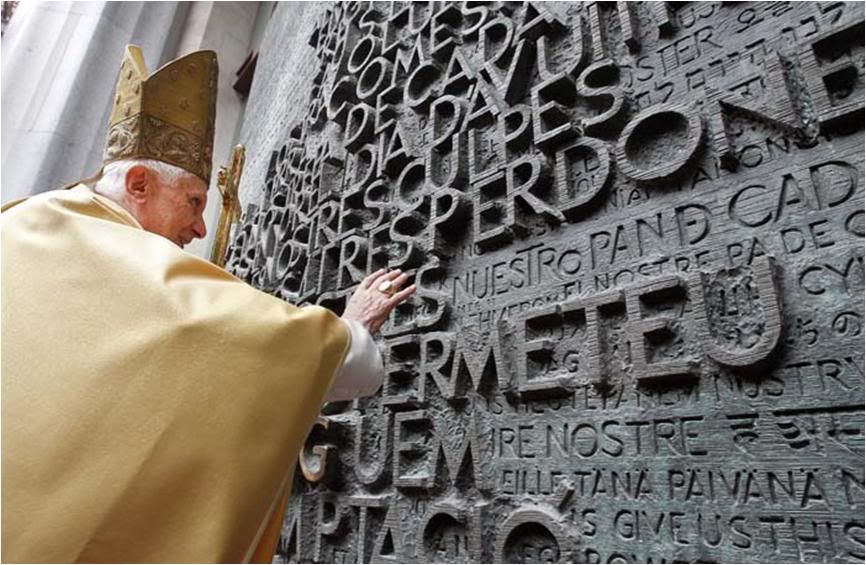 The Holy Father blesses the present main door to the Sagrada Familia on which the words of the Lord's Prayer in Catalan and Spanish are inscribed in relief.
Barcelona mayor hails
The Holy Father blesses the present main door to the Sagrada Familia on which the words of the Lord's Prayer in Catalan and Spanish are inscribed in relief.
Barcelona mayor hails
the Pope's visit
as a 'landmark' event

Barcelona, Spain, Nov 9, 2010 (CNA) - The mayor of Barcelona, Jorge Hereu, has remarked that Pope Benedict XVI’s visit to Spain was a “landmark” event in the country's history.
The Pope's Nov. 6 – 7 visit to the country included the dedication of the Church of the Holy Family in Barcelona. The Pontiff also consecrated it as a minor basilica.
According to the EFE news agency, the mayor noted the necessity of continuing work on the new basilica, which he called “one of the great universal icons of Barcelona.”
He invited all Spaniards to visit the Basilica of the Holy Family. “Up until now we have only seen the Holy Family from the outside, but now we can discover its marvelous interior,” he added.
Hereu called the Pope’s visit “a success” that proved the people of Catalonia could “organize a large international event.” [Well, they proved that in a big way in 1992, when they hosted the Summer Olympics!]
[Modificato da TERESA BENEDETTA 10/11/2010 19:22] |
| |
 10/11/2010 03:55 10/11/2010 03:55 |
|
| | | OFFLINE | | Post: 21.409
Post: 4.045 | Registrato il: 28/08/2005
Registrato il: 20/01/2009 | Administratore | Utente Master | |
|

 The impact of Benedict XVI's visit to Spain:
The impact of Benedict XVI's visit to Spain:
Interview with the editor of 'Catalunya Cristiana'

BARCELONA, Spain, NOV. 8, 2010 (Zenit.org).- Benedict XVI has had a great impact during his two-day visit to Spain, says Father Jaume Aymar, but now we must reflect on his message more profoundly.
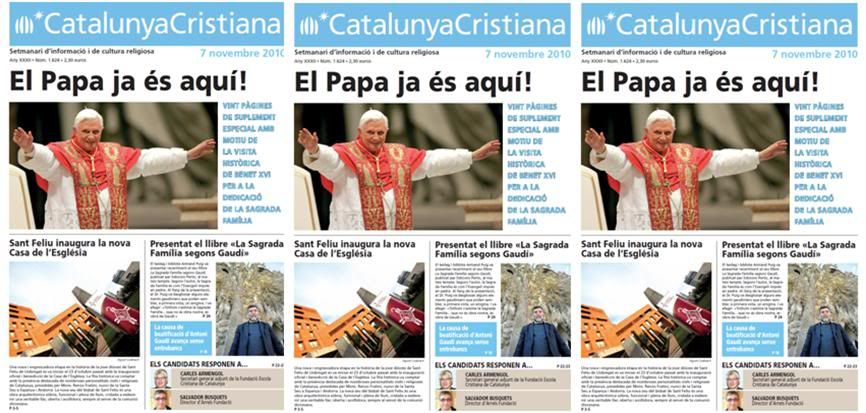 This week's issue of Catalunya Cristiana carries a 20-page special report on the Pope's visit but unfortunately, only Page 1 is available online.
This week's issue of Catalunya Cristiana carries a 20-page special report on the Pope's visit but unfortunately, only Page 1 is available online.
The director of Radio Estel and editor of the weekly newspaper Catalunya Cristiana spoke with ZENIT about the Pope's visit, which ended Sunday.
He noted the Pontiff's message including the invitation to overcome the split between human conscience and Christian conscience, the need for advances in medicine to respect human life and dignity, and the contribution of the faith to a more fitting and promising society.
Father Aymar pointed out that this visit also showed the public for the first time the interior of the church of the Sagrada Familia and has sparked greater general interest in the faith.
What is your overall evaluation of the Pope's visit to Barcelona?
My evaluation is very positive. In the first place because it's an historic event for the Pope to visit us. The last visit was 28 years ago, and this is almost a generation ago. It's something unusual.
Then, very important for me was the dedication of the Church of the Sagrada Familia because it is a church that those of us who were born in Barcelona have seen 'grow' day by day. To see the church finally covered [The construction of the roof over the ccatehdral came at a fairly late stage] and dedicated by the Holy Father is the fulfillment of a dream.
Also very important was the visit to the Obra Benefico-Social Nen Deu because it was another eloquent setting that is dear to me.
I saw the the Pope, if I can use the expression, as a grandfather visiting his grandchildren on a Sunday afternoon. He met with handicapped children, many of them from poor families. It's a very graphic way of saying: I am with you, the Pope is with you.
In your opinion, what were the most significant moments of this visit?
A very emotional moment for me was the Pope's entrance in the Sagrada Familia. Those who were close to him have told us that the Pope was really moved, because that forest of palms which is the interior of the Sagrada Familia is really overwhelming.
Then the moment when he handed the Papal Bull by virtue of which the church was declared a basilica. One could see the joy of the [archbishop of Barcelona] Cardinal Martinez Sistach when he showed it to the faithful and when he read it.
Also lovely was the Pope's look that he shared with the women religious of the Obra Benefico-Social Nen Deu and his gestures of tenderness for the children living there.
What do you think were his principal messages?
Interesting I think was what the Pope said in the homily, that "one of the most important tasks today is to overcome the split between human conscience and Christian conscience, between existence in this temporal world and openness to an eternal life, between the beauty of things and God as Beauty."
It is a view that does not have two societies, God's and men's, but which is one human society that must be open to the transcendent.
Also in the meeting with the handicapped, he said that it was imperative that the new technological developments in the medical field never be used in detriment to respect for human life and dignity.
When he took his leave in the airport, he made a good synthesis of his visit, saying that the Sagrada Familia and social work are as two symbols in today's Barcelona of the fecundity of that same faith that contributes to create a society more worthy of the human being.
And that final note, when he said that beauty, sanctity and love of God lead the human being to live in the world with hope.
Specifically, what impact do you think this visit is having and will have on Barcelona and the world?
I think that for many it was the occasion to discover the church of the Holy Family, starting with Barcelona's residents themselves, who have not seen it finished.
It has had scaffolding, and yesterday was the first day that it could be seen, either by being present there, or thanks to the television cameras and TV3's magnificent broadcast.
The Sagrada Familia is already one of the most visited monuments in Spain, but since this visit, it will be all the more so.
The visit of a Pope also leads to interest in the faith. This very morning I was in a public radio station and the speaker, who described himself as a non-believer, said to me: "These days I have learned much."
For non-believers or non-practicing believers, the visit of a Pope can be an occasion to be interested again in the religious and Christian phenomenon.
What is your opinion of the media coverage of the visit?
I think it was really extraordinary and that Barcelona rose to the occasion. In the press center set up in the Maritime Museum of Atarazanas there were journalists from all over the world.
On the part of our media, we are happy about the way the organization was carried out, with the logical difficulties and failures that can occur, but the evaluation is very positive.
There was talk of 150 million spectators: It's an extraordinary coverage and diffusion.
As editor of Catalunya Cristiana, I want to thank La Vanguardia newspaper, which in its Saturday supplement carried Catalunya Cristiana as an insert, with a print-run of 150,000 copies, which is an historic print-run for our weekly.
And the coverage by external media?
(here in Spain), there was an effort made to 'normalize' religious language. Ours is a society in which many have marked ignorance of religious events.
So, for example, the Catalan Media Corporation elaborated a linguistic home page, which included a glossary of useful religious terms for journalists and communicators. I think it was very important. It's been a good service, a document elaborated expressly for this visit, which explains things as basic as what a miter is, a staff, the rites.
Of course, the media also Reflected also attitudes against to the Pope's visit, but the media did so because they exist; we are in a plural society.
However, what is most serious and most worrying is not that, but indifference. Blessed Teresa of Calcutta said it: The worst evil is indifference.
If someone opposed the visit, with his reasons, he can be answered. What is worrisone is indifference or those who were even unaware of the visit.
Maximum audiences for Spanish TV
coverage of the Pope's visit
Adapted and translated from the Italian service of

MADRID, Nov. 8 (ZENIT.org). - On Spanish TV, 12.4 million persons watched at any given moment the visit of Benedict XVI to Santiago de Compostela and Barcelona, according to Spanish state radio.
For the weekend, TVE - state television - transmitted 32 hours of programming dedicated exclusively to the visit on its three channels.
It included direct and full coverage of both Masses as well as specials for the visit. Later on, it re-broadcast the material.
And the two regional TV networks registered historical audiences.
Televisión de Galicia noted that 45% of residents followed their direct broadcasts at any given moment, and Televisió de Catalunya, which had six hours of live broadcasts, reported viewership at any moment to be around 1.6 million.
The two regional networks were in charge of producing the official broadcasts, which were subscribed to by more than 1,000 TV channels around the world, and for which they deployed an extraordinary amount of human and technical resources.
Televisión de Galicia had 60 TV cameras covering the Pope's itinerary from Lavacolla airport to the Cathedral, the rites inside the Cathedral, the afternoon Mass and the Pope's departure. These were supported by 19 mobile vans and another 12 vans to transmit the broadcasts by satellite. All in all, it deployed 500 professionals, between technicians and journalists, to cover the visit.
Catalunya's TV3, veteran of covering the 1992 Olympics, said the event was one of their largest coverages, using 60 TV cameras with the most up-to-date technology to follow the Pope's motorcade, deployed outside and within Sagrada Familia, on a helicopter, and one in the Popemobile itself.
Within Sagrada Familia alone, 32 TV cameras were deployed, including experimental 3D cameras and a 'spider camera' suspended from the ceiling by special cables that enabled it to 'travel' across the ceiling to cover the Mass from overhead, and microcameras to capture details of the rite.
All told, at least 150 million persons around the world watched the visit on TV, based on viewership in the countries and channels that had subscribed to the coverage. This does not include 'internauts' who followed the visit through various Web applications.
This is certainly one of the supreme paradoxes in secular Spain - for public TV to have been so involved in covering the Pope's visit. Obviously, the interest of so many TV channels worldwide to subscribe to their services was a healthy financial incentive. During Benedict XVI's Pontificate so far, I do not recall a similar worldwide demand for direct coverage of a papal visit (other than EWTN which broadcasts CTV coverage to its various outlets in Asia, Europe and the Americas). I imagine that the subscribers to the visit coverage are those that usually subscribe regularly to the broadcast of the Pope's Midnight Mass at Christmas, and Urbi et Orbi blessings on Christmas Day, New year's Day and Easter.... And still some in MSM will persist in saying that the public has little interest in Benedict XVI!
[Modificato da TERESA BENEDETTA 10/11/2010 19:28] |
| |
 10/11/2010 13:20 10/11/2010 13:20 |
|
| | | OFFLINE | | Post: 21.410
Post: 4.046 | Registrato il: 28/08/2005
Registrato il: 20/01/2009 | Administratore | Utente Master | |
|
 Nov. 10, Wednesday, 32nd Week in Ordinary Time
Nov. 10, Wednesday, 32nd Week in Ordinary Time
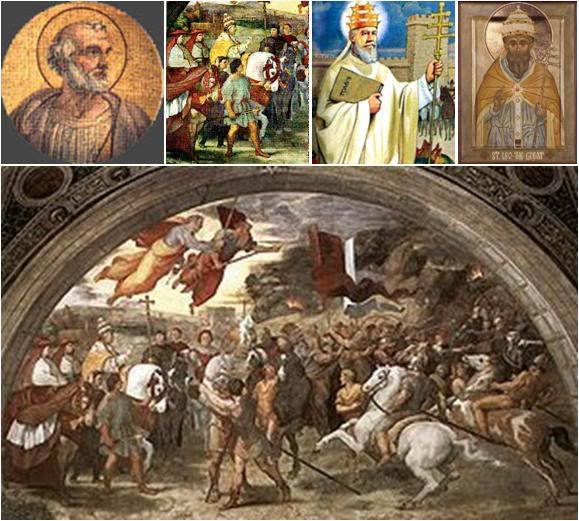 Raphael's 'Leo the Great Meets Attila the Hun', 1541, Vatican fresco. The Apostles Peter and Paul are shown above the figure of the Pope, left.
ST. LEO THE GREAT (b. ca 400, Pope 440-461), Doctor of the Church (Doctor of Doctrine)
Raphael's 'Leo the Great Meets Attila the Hun', 1541, Vatican fresco. The Apostles Peter and Paul are shown above the figure of the Pope, left.
ST. LEO THE GREAT (b. ca 400, Pope 440-461), Doctor of the Church (Doctor of Doctrine)
Born to a noble Tuscan family, he came to a position of importance in the imperial court. When he was 40, he was
sent by the emperor to settle a dispute between the two highest officials in Gaul. During the mission, Pope Sixtus II
died and he was unanimously elected by the people to succeed him. As Pope, he was responsible for the first
administrative consolidation of the Church, distinguishing himself in four other critical areas: He controlled a number
of prevalent heresies in his time; at the Council of Chalcedon, he definitively declared the dual nature of Christ;
he defended Rome from barbarian attacks and is remembered for meeting Attila the Hun and keeping him from
invading Rome; and for the spiritual depth of his pastoral care, with a call to holiness embodied in his great sermons.
OR today.
No papal photos in this issue, Page 1 features the Holy Father's message to the ongoing General Assembly of the Italian bishops in Assisi
[translated and posted on this page on Monday], and inside, an interview with Cardinal Julian Herranz, who was with the Pope on the trip
to Spain. Page 1 international news: A new chill between Israeli PM Netanyahu and the White House over East Jerusalem construction work;
the International Labor Union says there are now about 310 million unemployed around the world - 31-million more than the level in 2007
before the financial crisis started in 2008; and the US Federal Reserve is criticized worldwide for decision to 'monetize' part of the national
debt thus flooding the market with at least $600 billion in paper money - the decision causes China's yuan to post its strongest level
against the dollar in many years.
THE POPE'S DAY
General Audience today - As expected, the Holy Father reported on his visit to Spain, stressing his appeal for Europe
to once more open itself to God, and for dialog between faith and reason, religion and politics, ethics and economics.
Cardinal Tauran delivers letter
from the Pope to Iran's President
By Sarah Delaney

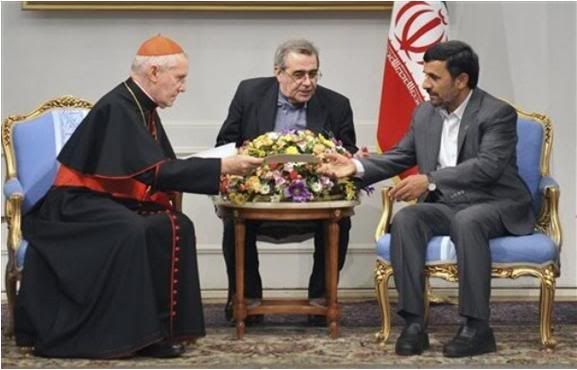
VATICAN CITY, Nov. 10 (CNS) -- A top Vatican official met with Iranian President Mahmoud Ahmadinejad in Teheran and gave him a letter from Pope Benedict XVI, a Vatican spokesman said.
The letter was hand-delivered in Teheran Nov. 9 by Cardinal Jean-Louis Tauran, president of the Pontifical Council for Inter-Religious Dialogue, said Passionist Father Ciro Benedettini, vice-director of the Vatican press office, today.
Cardinal Tauran met personally with the Iranian leader while the Vatican official was participating in a three-day meeting regarding Muslim-Christian relations. The meeting, a joint initiative of the Vatican inter-religious council and the Teheran-based Islamic Culture and Relations Organization, included leaders of the local Catholic church.
In October, an Iranian official delivered a letter from Ahmadinejad to Pope Benedict in which the president said he hoped to work closely with the Vatican to help stem religious intolerance, the break up of families and the increase of secularism and materialism.
On that occasion, the contents of the letter were released by Iranian news agencies.
Father Benedettini did not disclose the contents of the letter from Pope Benedict.
 - Getting much media play these days is the latest outrageous declaration by failed assassin Ali Agca, who now says the mastermind behind the plot to kill John Paul II was actually the man who was then his Secretary of State, the late Cardinal Agustin Casaroli (widely credited with carrying on the Vatican's Ostpolitik strategy of 'appeasement coexistence' with the Soviet regimes during the Cold War, in order to minimize persecution of Catholic bishops and clergy). [Why the MSM play up every mad rant that comes from Agca puzzles me, when he is clearly either a madman, or a wily schemer who is trying to exploit his notoriety in order to make big bucks from future movie or book deals!]
- Getting much media play these days is the latest outrageous declaration by failed assassin Ali Agca, who now says the mastermind behind the plot to kill John Paul II was actually the man who was then his Secretary of State, the late Cardinal Agustin Casaroli (widely credited with carrying on the Vatican's Ostpolitik strategy of 'appeasement coexistence' with the Soviet regimes during the Cold War, in order to minimize persecution of Catholic bishops and clergy). [Why the MSM play up every mad rant that comes from Agca puzzles me, when he is clearly either a madman, or a wily schemer who is trying to exploit his notoriety in order to make big bucks from future movie or book deals!]
- Someone in the Anglophone media - Father Z, in fact - finally picked up on the highly significant message sent by Benedict XVI to the current General Assembly of Italian bishops.... But Fr. Z still has not wirtten a word about the momentous weekend events in Spain!
- I just found online a long interview done by La Vanguardia with Peter Seewald and published Sunday. I will translate and post as soon as I can.
[Modificato da TERESA BENEDETTA 10/11/2010 23:54] |
| |
 10/11/2010 16:01 10/11/2010 16:01 |
|
| | | OFFLINE | | Post: 21.411
Post: 4.047 | Registrato il: 28/08/2005
Registrato il: 20/01/2009 | Administratore | Utente Master | |
|
 GENERAL AUDIENCE TODAY:
GENERAL AUDIENCE TODAY:
The Pope reports on trip to Spain
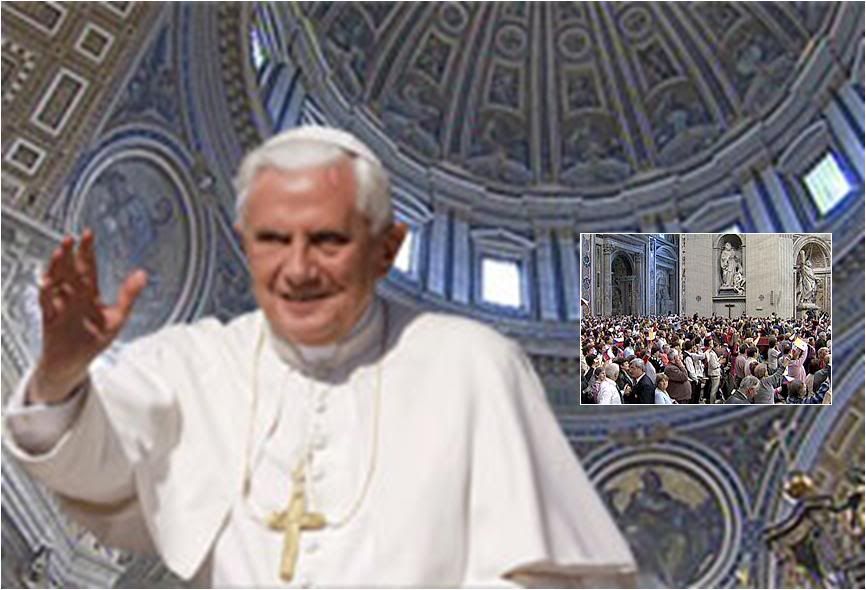
Today's general audience was in two parts. First, the Holy Father greeted two large pilgrim groups from Carpineto Romano and from the Czech Republic in St. Peter's Basilica.
Both large delegations were there to thank him for his visit to their respective dioceses - to the Czech Republic in September last year, and to Carpineto Romano last July. In turn, he thanked them for their hospitality and participation during his visits.
here is what he told the pilgrims:
I am happy to give each of you my heartfelt welcome. In particular, I greet you, the faithful of Carpineto Romano, who are here with your pastor, Mons. Lorenzo Loppa, to return the brief but intense visit that I had the joy of making to your city last September for the bicentenary of the birth of Pope Leo XIII.
Dear friends, I wish to renew my sincere thanks for the warm reception you gave me on that occasion - the civilian authorities, especially the mayor and the Coummnal Council; and the diligent efforts of your Bishop, your parish priests and their co-workers, especially in the Eucharistic celebration that was so carefully prepared and well-participated.
May the memory of that visit, which was full of ecclesial and spiritual significance, revive in each one the desire to deepen ever more your life of faith, following the teachings of your illustrious townmate, Pope Leo XIII, whose courageous pastoral action led to a farsighted renewal of Catholic social commitment.
Dear friends, do not tire of entrusting yourselves to Christ and to announce him with your life, in the family and in every field. This is what men today expect of the Church.
With these sentiments, I impart to all my Benediction which I gladly extend to your families and all those dear to you.
In Czech, he said:
I hartily greet the pilgrims from the Czech Republic who are present in great number here today to return the visit that I had the joy of making to your country last year. Dear friends, you are all welcome.
I keep a dear and grateful memory of my most pleasant trip to your beautiful land - of the deferential courtesy of various authorities the warm welcome from my venerated brothers in the Episcopate, from and the priests, consecrated persons and all the faithful who expressed their faith with enthusiasm around the Successor of Peter.
I was also struck by the attentive consideration given to me by those who, although they have been alienated from the Church, are nonetheless still in search of authentic human and spiritual values, those to which the Catholic communities wish to be joyous witnesses.
I pray the Lord to multiply the graces from that trip and I hope that the Christian people of the Czech Republic continue, with renewed impetus, to render courageous evangelical witness everywhere.
To all of you, I impart a special Apostolic Blessing, which extends to your families and to your entire homeland.
Afterwards, he proceeded to the Aula Paolo VI where he gave his regular catechesis, this time to report on his weekend visit to Spain.
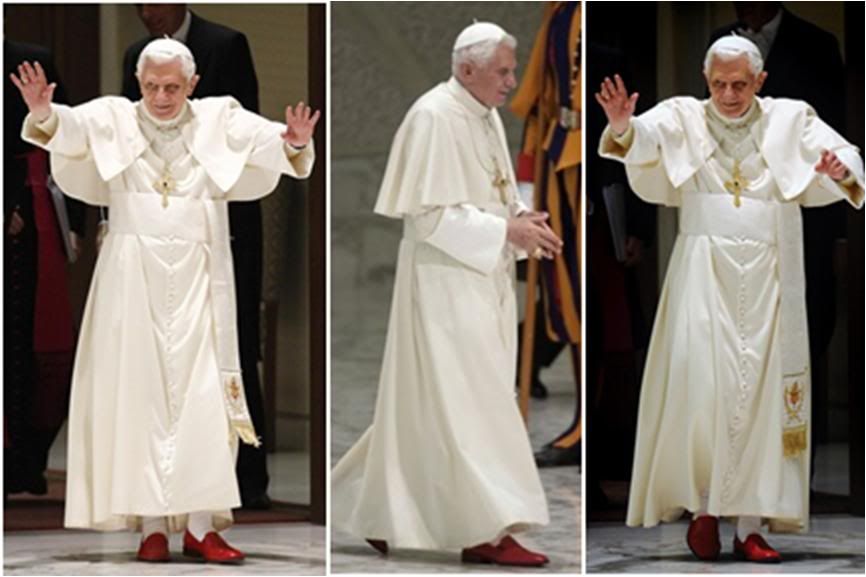
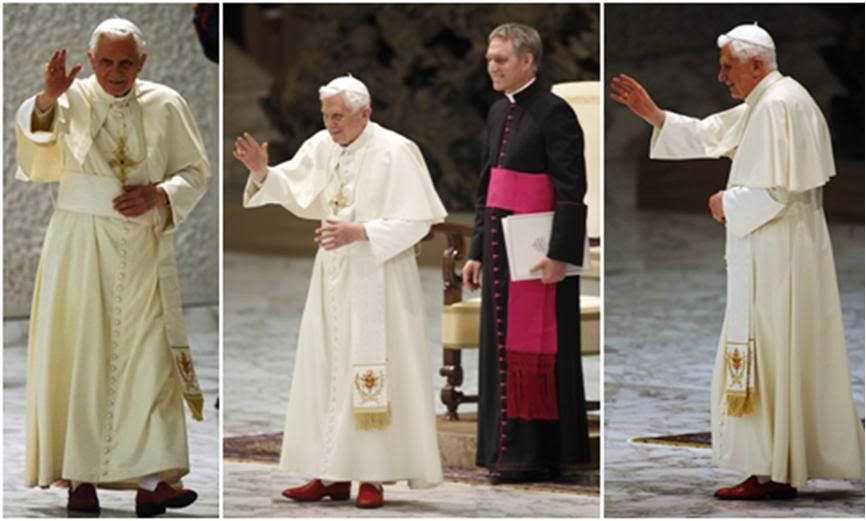
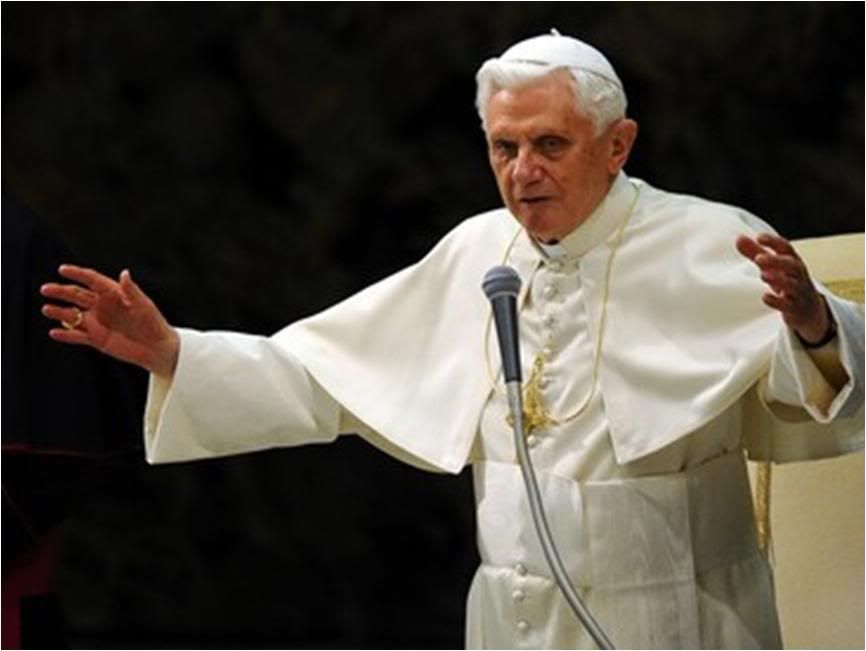 Here is how he synthesized his visit to Spain in English:
Here is how he synthesized his visit to Spain in English:
This past weekend I made an Apostolic Journey to Santiago de Compostela and Barcelona, two great cities of Spain and Europe.
I came as a pilgrim among pilgrims in this Holy Year of Compostela, to venerate the Apostle Saint James the Greater. The traditional practice of embracing the image of the Saint symbolizes our embrace of the Gospel which he preached and the mission which we receive in Baptism to bear daily witness to Christ and to strengthen society by our fidelity to the wisdom and truth of the Gospel.
On Sunday, in Barcelona, I dedicated the Church of the Sagrada Familia, the masterpiece of the great architect Antoni Gaudí. In this magnificent edifice Gaudí wished to celebrate the eternal source of all beauty, made flesh in Jesus Christ, who calls all humanity to become, in the Church, a temple in which God dwells.
Let us pray for all families, that they may fulfil their unique role in society, and for all the people of Spain and Europe, that they may always find in their Christian roots the inspiration to pursue, along the pathways of our time, the historic mission of the Continent in today’s world.
I offer a warm welcome to all the English-speaking visitors present at today’s Audience, especially those from England, Denmark, Sweden, Japan and the United States of America. Upon you and your families I invoke Almighty God’s blessings of joy and peace.
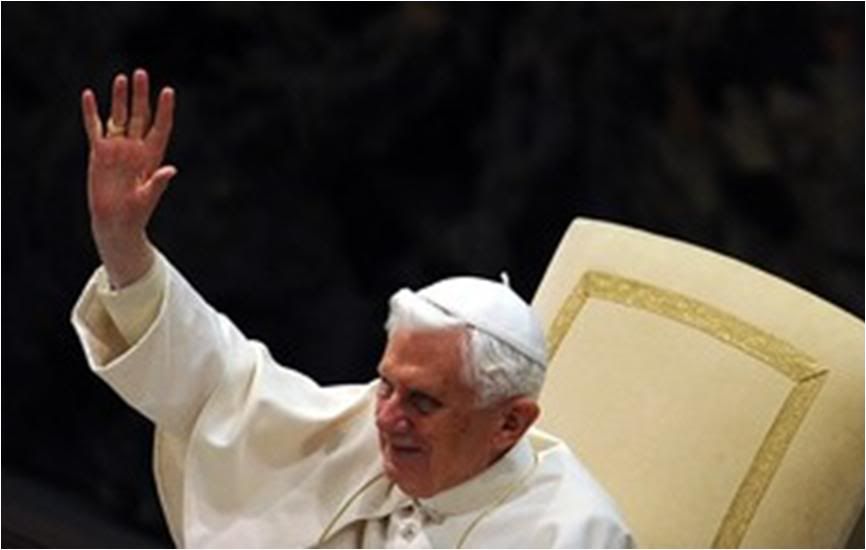 Here is a translation of the full report:
Here is a translation of the full report:
Today I wish to recall with you the apostolic visit to Santiago de Compostela and Barcelona thwt I had the joy of making last Saturday and Sunday.
I went to Spain to confirm my brothers in the faith (cfr Lk 22,32). I did so as a witness to the Risen Christ, as a sower of the hope that does not disappoint nor deceive, because it has its origin in the infinite love of God for all men.
The first stop was Santiago. Starting with the welcome ceremony, I experienced the affection that the people of Spain have for the Successor of Peter. I was truly welcomed with great enthusiasm and warmth.
On this Holy Year for Compostela, I wished to be a pilgrim myself among all the great many pilgrims to that famous shrine. I was able to visit 'the home' of the Apostle James the Greater, who continues to say to all who come to him in need of grace, that in Christ, God came to the world to reconcile it to him, in order to redeem man from his sins.
In the imposing Cathedral of Compostela, and with great emotion, as I gave the traditional embrace to the saint, I thought about how this gesture of friendship and welcome is also a way of expressing adherence to his words and participation in his mission.
It is a strong sign of the will to conform ourselves to the apostolic message, which, on the one hand, commits us to be faithful custodians of the Good News that the Apostles have transmitted to us, but without the temptation to alter, diminish or bend it to other interests, and on the other hand, transforms each of us to tireless announcers of faith in Christ, in words and with the testimony of our life in all fields of society.
Seeing the great number of pilgrims present at the solemn Holy Mass that I had the rgeat joy of presiding over in Santiago, I meditated on that which urges so many men to leave their daily occupations to undertake the penitential way to Compostela, a way that is long and arduous. It is the desire to reach the light of Christ that men desire in the depth of their heart, even if they often do not know how to express it in words.
In times of disorientation, of searching, of difficulties, as well as in the aspiration to reinforce one's faith and to live it in a more consistent way, the pilgrims to Compostela undertake a profound itinerary of conversion to Christ, who took upon him the weaknesses and the sins of mankind, the miseries of the world, bringing them to where evil no longer has any power, where the light of goodness illumines everything.
We speak of a community of silent walkers, coming from every part of the world, who have rediscovered the age-old medieval and Christian tradition of pilgrimage, passing through cities and towns that are permeated with Catholicism.
In that solemn Eucharist, lived by all the faithful present with intense participation and devotion, I asked the Lord with fervor that all those who come on pilgrimage to Santiago may receive the gift of becoming true witnesses to Christ that they rediscover at the crossroads of the evocative ways leading to Compostela.
I also prayed that pilgrims, following the footsteps of numerous saints who completed the Camino de Santiago through the centuries, may continue to keep alive the genuine religious, spiritual and penitential significance of the pilgrimage, without yielding to banality, distractions or fashion.
The Way of St. James, over roads that cut through vast territories to form a network through the Iberian Peninsula and Europe, was and continues to be a meeting place for men and women of the most diverse origins, who are united in the search for faith and for the truth about themselves, inspiring profound experiences of sharing, fraternity and solidarity.
It is truly faith in Christ that gives sense to Compostela, a spiritually extraordinary place, which continues to be the point of reference for the Europe of today in her new configurations and perspectives.
To conserve and reinforce the openness to the transcendent, along with a fruitful dialog between faith and reason, between politics and religion, between economics and ethics, will allow the building of a Europe which, faithful to her indispensable Christian roots, can fully respond to her own vocation and mission in the world.
Thus, with certainty about the immense possiblities of the European continent and confident in her future of hope, I called on Europe to open itself increasingly to God, in order to favor the prospects of an authentic encounter that is respectful and brotherly with the peoples and civilizations of other continents.
On Sunday, I had the truly great joy of presiding in Barcelona at the dedication of the church of La Sagrada Familia, that I also declared a minor basilica.
In contemplating the grandeur and beauty of that edifice, which invites lifting up one's soul to God, I thought of the great religious constructions, like the Cathedrals of the Middle Ages, that have profoundly marked the history and the physiognonmy of the principal cities of Europe.
That splendid work - which is extremely rich with religious symbology, and precious in its web of forms, fascinating in its play of light and colors - almost an immense sculpture in stone, and fruit of the profound faith, spiritual sensibility and artistic talent of Antoni Gaudi, remands us to the true shrine, the place of real worship, Heaven, where Christ came to sit with God in our favor (cfr Heb 9,24).
In that magnificent temple, Gaudi, the architect genius, has represented admirably the mystery of the Church to which the faithful become incorporated through baptism as living stones in the construction of a spiritual edifice (cfr 1Pt 2,5).
The church of La Sagrada Familia was conceived and planned by Gaudi as a great catechesis on Jesus Christ and as a hymn of praise to the Creator. In that very imposing building, he placed his own genius in the service of beauty.
Indeed, the extraordinary expressive and sympolic capacity of its artistic forms asnd motifs, as well as its technological innovations, both architectonic and sculptural, evoke the Supreme Origin of every beautiful thing.
The famous architect considered this work as a mission into which he invested his entire person. From the moment that he accepted the responsibility for building that church, his life was marked with a profound change. He undertook an intense regimen of prayer, fasting and poverty, realizing the need to prepare himself spiritually in order to succeed in expressing the unfathomable mystery of God in material reality.
One can say that while Gaudi worked on building the temple, God built in him a spiritual edifice (cfr Eph 2,22), reinforcing him in the faith and bringing him ever closer to intimacy with Christ. Inspiring himself continually by Nature, the Creator's work, and dedicating himself with passion to the study of Sacred Scripture and liturgy, he was able to realize in the heart of the city an edifice worthy of God, and therefore, worthy of man.
In Barcelona, I also visited the Opera Nen Deu, an initiative that is over a century old, very much bound to the Archdiocese, which, with professionalism and love, cares for children and youth who are disabled in various ways. Their lives are precious in the eyes of God and invite us constantly to step out of ourselves.
In that house, I took part in the joy and in the profound and unconditional charity of the Franciscan Sisters of the Sacred Hearts of Jesus and Mary, in the generous work of doctors, educators and so many other professionals and volunteers, who work with admirable dedication in that institution.
I also blessed the first stone of a new residence which will be part of this institute, in which everything speaks of charity, of respect for the person and his dignity, of profound joy that the human being is valuable for what he is and not only for what he does.
While I was in Barcelona, I prayed intesely for families, vital cells and hope of society and the Church. I also remembered those who suffer, especially in these times of serious economic difficulties.
I thought of the young people - who accompanied me throughout the visit to Santiago and Barcelona with their enthusiasm and joy - and prayed that they may discover the beauty, the value and the commitment of matrimony, in which a man and a woman unite to form a family that will generously welcome life and care for it from its conception to its natural end.
Everything that is done to sustain matrimony and the family, to help the most needy persons, everything that can grow the greatness of man and his inviolable dignity, contributes to the perfection of society. No effort is in vain, in this respect.
Dear friends, I give thanks to God for these intense days that I spent in Santiago de Compostela and Barcelona. I renew my thanks to the King and Queen of Spain, to the Princes of Asturias, and to all the authorities.
I turn my grateful and affectionate thoughts once more to my dear brother Archbishops in the two local Churches and to their co-workers, and to all who gave themselves so generously so that my visit to those two marvellous cities would be fruitful.
They were unforgettable days that will remain imprinted in my heart. In particular, the two Eucharistic celebrations - which were prepared with great care and intensely experienced by all the faithful, with the music taken from both the great musical tradition of the Church as well as from the genius of modern composers - were moments of true interior joy.
May God reward everyone as only he knows how. May the Most Holy Mother of God and the Apostle St. James continue to accompany their journey through life with their protection.
Next year, God willing, I shall be going to Spain again, to Madrid for World Youth Day. I entrust to your prayers this farsighted initiative so that it may be an opportunity for so many young people to grow in the faith.
In his greeting to Spanish-speaking pilgrims, he gave more specific thanks:
I greet Spanish-speaking pilgrims and invite them to give thanks to God for the success of my apostolic trip to Santiago de Compsotela and Barcelona.
I keep an unforgettable memory of the graciousness with which I was welcomed in Compostela by Their Royal Highnesses the Princes of Asturias, and with which Their Majesties the King and Queen of
Spain bade me farewell in Barcelona.
I also wish to thank all the authorities and the forces of law and order for all the work they did so efficiently so that my visit would take place smoothly.
I reiterate my affectionate thanks to the Archbishops of the two local Churches, and to the many people who accompanied me with extreme cordiality in all the celebratory acts in those two emblematic cities.
I ask the Lord to copiously bless the pastors and the faithful of those noble lands, so that they may live their faith and trasnmit it with valor, being Chrsitians as well as citizens, and citizens as well as Christians.
I will return to Spain, God willing, for the celebration of World Youth Day next year. Once more, many thanks to all the Spanish people.
In his final Italian greeting, he said:
Now I address young people, newlyweds, and the sick. In yesterday's liturgy, we celebrated the feast of the Dedication of the Basilica of St. John Lateran, "caput et mater omnium ecclesiarum", head and mother of all churches.
Along with the Basilica, we commemorate all the churches in which communites are gathered and those that are still to be built in Rome and in the world....
I call on you to work with the People of God and all men of good will to realize the House of the Lord. May you always be 'living stones' in the spiritual edifice of the Church, journeying together in the service of the Gospel, in offering prayers and in sharing charity.
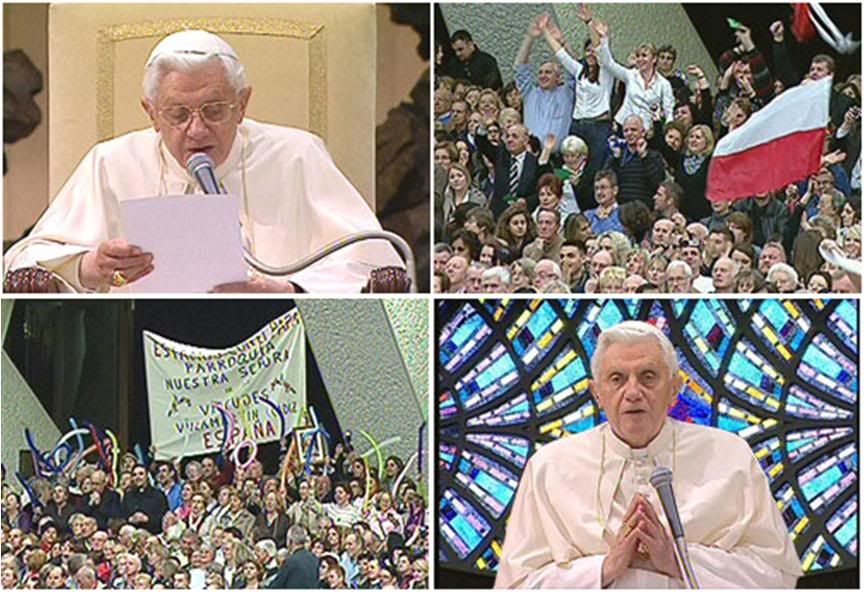
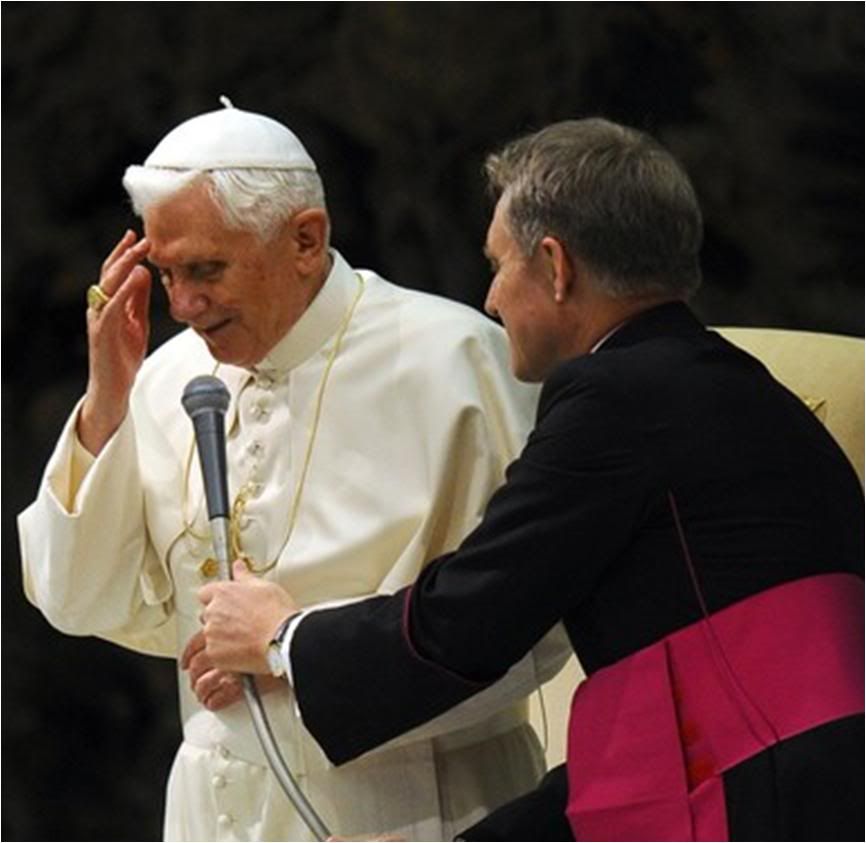
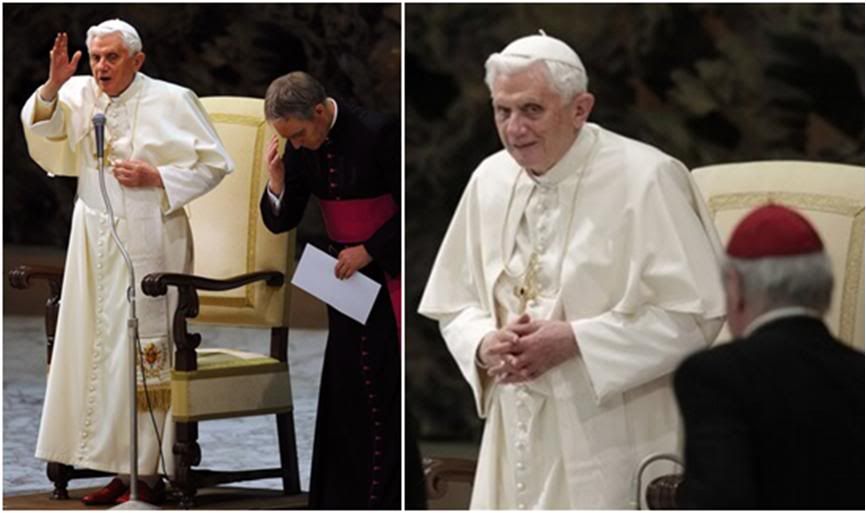
After the General Audience, the Holy Father Benedict XVI met at the Auletta of the Aula Paolo VI with H.E. Ranko Krivokapić, President of the Parliament of Montenegro, with his delegation.
Spain revisited

10 NOV (RV) - On Wednesday Pope Benedict XVI told an estimated 8,000 pilgrims in Aula Paolo VI that “no effort is in vain when it contributes to the advancement of the human being and his inviolable dignity”.
He underscored the need to maintain a "fruitful dialogue between faith and reason, between religion and politics, between economics and ethics" and the need to affirm that "everything that is done to support marriage and family, to help those most in need”, “ contributes to the improvement of society”.
The Pope’s reflections were inspired by his two-day pastoral trip to Spain this weekend which took him to the northern city of Santiago de Compstela, a centuries old destination for Europe’s pilgrims, and yp Barcelona to dedicate Gaudi’s masterpiece, the church of La Sagrada Familia, which he also declared a basilica.
“I came as a pilgrim among pilgrims in this Holy Year of Compostela, to venerate the Apostle Saint James the Greater. The traditional practice of embracing the image of the Saint symbolizes our embrace of the Gospel which he preached and the mission which we receive in Baptism to bear daily witness to Christ and to strengthen society by our fidelity to the wisdom and truth of the Gospel”.
Indeed, from the tomb of the Apostle, the Holy Father declared that "faith is the reference point for the Europe of today " and that faith "will allow for the construction of a Europe which, true to its indispensable Christian roots, is able to respond fully to its vocation and mission in the world. "
From the Way of St James, to the heart of Catalonian Christianity, the Pope said “On Sunday, in Barcelona, I dedicated the Church of the Sagrada Familia, the masterpiece of the great architect Antoni Gaudí. In this magnificent edifice Gaudí wished to celebrate the eternal source of all beauty, made flesh in Jesus Christ, who calls all humanity to become, in the Church, a temple in which God dwells”.
Pope Benedict said that Gaudi invested his entire self in this mission, undertaking an intense practice of fasting, prayer and poverty to spiritually prepare to give expression to God.
About dedicating the basilica he added, "I also remembered those who suffer, especially in these times of serious economic difficulties. I kept in mind at the same time, young people, who have accompanied me throughout the visit to Santiago and Barcelona with their enthusiasm and joy, that they may discover the beauty, value and the commitment of marriage, in which a man and a woman form a family, who generously welcome life from conception until its natural end. Everything that is done to support marriage and family, to help people in need, all that increases the greatness of man and his inviolable dignity, contributes to the improvement of society. No effort is in vain in this area".
He concluded by describing this short but intense papal voyage, his 18th outside Italy, as "unforgettable”, which allowed him to "experience the love that the people of Spain have for the successor of Peter" who became a "pilgrim among pilgrims”.
“Let us pray for all families, that they may fulfil their unique role in society, and for all the people of Spain and Europe, that they may always find in their Christian roots the inspiration to pursue, along the pathways of our time, the historic mission of the Continent in today’s world”.
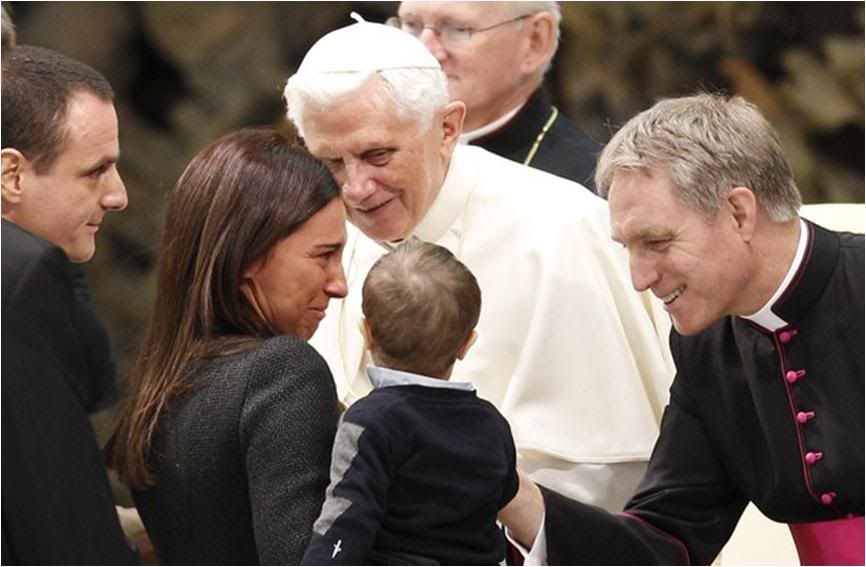
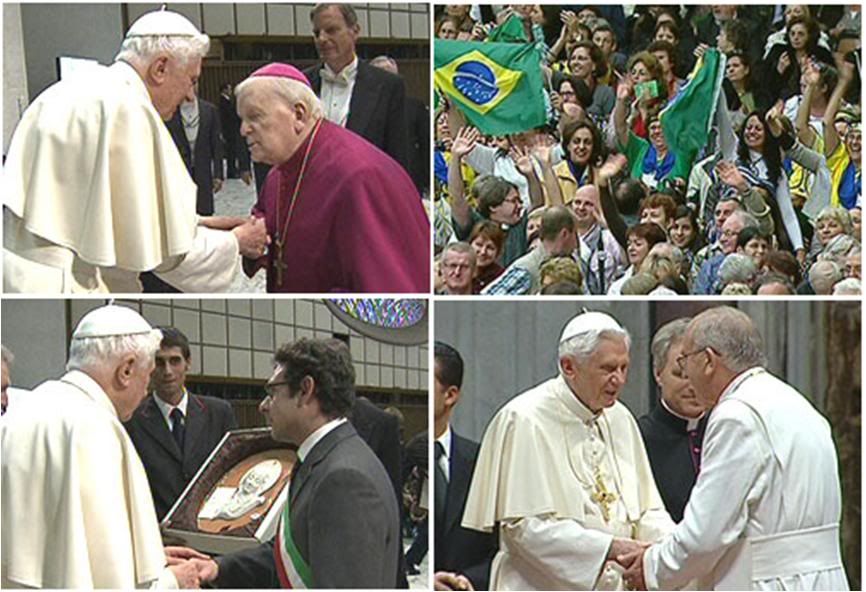
'Tea break' for the Pope:
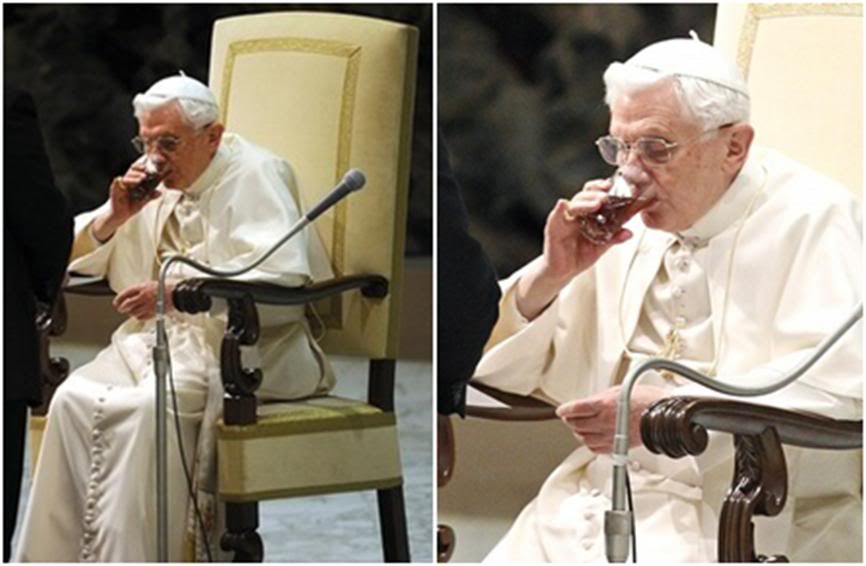
[Modificato da TERESA BENEDETTA 11/11/2010 18:08] |
| |
 10/11/2010 19:11 10/11/2010 19:11 |
|
| | | OFFLINE | | Post: 21.412
Post: 4.048 | Registrato il: 28/08/2005
Registrato il: 20/01/2009 | Administratore | Utente Master | |
|

 In contrast to the almost 'deafening' and inexplicable silence in the Anglophone media about the Holy Father's emblematic double-barreled mission to Spain this weekend - even the usually ubiquitous John Allen has not been heard from, and Father Z has said nothing about it on his blog [Where were they this weekend???] - the Spanish and Italian media have been churning out substantial commentary. I am limited by time constraints and paywall blocks in the Spanish media from posting more than I have posted so far, but I will try to post what I can as soon as I can of those that are most significant and interesting, such as the following:
Following the Pope on TV -
In contrast to the almost 'deafening' and inexplicable silence in the Anglophone media about the Holy Father's emblematic double-barreled mission to Spain this weekend - even the usually ubiquitous John Allen has not been heard from, and Father Z has said nothing about it on his blog [Where were they this weekend???] - the Spanish and Italian media have been churning out substantial commentary. I am limited by time constraints and paywall blocks in the Spanish media from posting more than I have posted so far, but I will try to post what I can as soon as I can of those that are most significant and interesting, such as the following:
Following the Pope on TV -
and discovering the man and his method
by Fernando de Haro
Translated from

Nov. 10, 2010
Haro is Information Editor of Spain's TV Popular.
Television has an advantage - informational TV that broadcats events live, not the kind that dispenses misleading news reports. Live TV has the advantage of conveying to viewers much of what is happening without the filter or bias of 'published' opinion.
Thus many millions availed well of it this weekend when Benedict XVI was in Spain. And yet, our country became an exception in the case of the press reportage about the Pope.
In other countries that he has visited, even the most secular press, as in the United Kingdom, acknowledged the stature and the truth represented by the Pope.
But ours, confirming the words of the Pope himself, clung to old anti-clerical schemes. While most print media, which are increasingly less read, stuck to their old prejudices, and as the more convervative press, in promoting the trip, defended their own schemes in favor of certain values and plans for re-Christianization plans, regular folk were glued to the TV screens, magnetized by the images showing the movements, the words and the look of the man in white.
And what they watched was something rare and exceptional.
During the 32 hours that the Pope was among us, we saw a man who was humble but clear - one cound understand everything he said [it helps a lot that. along with French, Spanish is the foreign language he speaks most beautifully] - in whom words and gestures coincided.
It is even easier to understand who he is when one sees how he enjoys beauty and uses it as a teaching tool, how he looks at children with Downs syndrome, how he greets those who have stood for hours just to have a glimpse of him, how he proposes - without tangling himself up in futile confrontations - that God is not an enemy to man, that "between truth and freedom, there is a close and necessary relation".
His words do not contain pious projects or necessarily 'religious' reflections, but are rather a description of the contemporary situation, what is happening around us.
It was easy to understand that the truth is not an enemy of freedom because in front of us, we could see that Ratzinger the man is clearly a free man - free to speak the truth.
We saw in him a European who recognizes that "God exists and it is he who gave us life".
We saw in him a German, who has studied and knows the grandeur as well as the limitations of Europe, affirm that "only God is absolute, faithful and unfailing love, that infinite goal that is glimpsed behind the good, the true and the beautiful things of this world, admirable indeed, but insufficient for the human heart" (Homily in Santiago).
We have seen a man who has 'overcome the division between human consciousness and Christian conscience' (Homily at Sagrada Familia).
And all that is what kept us glued to our TV screens.
In effect, when pointing to the Christ Pantocrator in Compostela's Portico of Glory, he was showing us the origin of his compelling humanity that so captivated us for all of 32 hours.
Benedict, father and teacher, also taught us his method. Plans to recover the Christian roots of Europe are futile unless... The real challenge is to see the Church as a pilgrim Church, and to be a pilgrim means "to step out of ourselves in order to encounter God where he has revealed himself, where his grace has shone with particular splendour and produced rich fruits of conversion and holiness among those who believe" (Remarks during his visit to teh Cathedral of Compostela).
And that is Benedict XVI's surprising 'method': to move ahead towards an encounter with what God does and has done.
I had earlier translated the first post-visit commentary from Jose Luis Restan but working on it late last night, I was obviously too woozy to be fully functional and lost the translation while posting it - then realized that I had not copied it to the mouse first, so there was no way to salvage it...
The following interview is with Spanish Cardinal Julian Herranz, emeritus president of the Pontifical Council for Legislative Texts He was one of three Rome-based Spanish cardinals who accompanied the Holy Father this weekend from Rome, along with - Cardinal Canizares of CDW and emeritus proto-chamberlain Cardinal Eduardo Martinez Somalo:
The Pope's trip to Spain:
A time of grace
Interview with Cardinal Julian Herranz
by Mario Ponzi
Translated from the 11/10 issue of

A time of grace which Spain should avail of to reflect on her destiny and future. Therefore, although the Pope's Magisterium is addressed to the common good of all men, "it is a good thing that the Spanish people have heard the words of Benedict XVI as words directed to them especially, words that have struck a chord to the point of opening a national debate about what he said".
These are the primary impressions of Cardinal Julian Herranz, emeritus president of the Pontifical Council for Legislative Texts, who travelled with the Pope to Spain this weekend.
A native of Baena in the diocese of Cordoba, the cardinal knows his people well. He considers the Pope's visit 'extremely positive' because it can serve to rekindle the flame of a faith that has been subdued but never extinguished in the hearts of the Spanish people.
"The welcome that they showed Benedict XVI was a clear signal in this respect," the cardinal said in an interview with us on the flight back to Rome from Barcelona.
What did it feel like to be with the Pope on your native soil?
The first sensation I felt was the need to thank God for having granted my country a time of grace that was so intense. With this visit, Spain has been enriched with the affection, and above all, the magisterium of Benedict XVI.
We all know his ability to offer the profundity of his teaching in a way that is extraordinarily intelligible. He always says the right words at the right moment - that is one of his gifts. And in Spain, he did just that.
What kind of discourse between the Pope and Spain do you think will come out of this trip?
The Pope's magisterium, like Christ's doctrine, is profoundly constructive. He always seeks what is good for man, harmonizing things that should be harmonized and not kept in opposition. If he insists on the harmony between science and faith, for example, he obviously thinks the world needs that harmony today.
Likewise, it was not the first time he spoke of the challenge from secularism, and he has renewed the invitation for a constructive encounter with religion. So it was natural that he emphasized these themes in Spain.
Like the rest of Europe, Spain has been engulfed in a wave of secularism, a fact that cannot be denied. So it is best to confront it, starting from the premise that dialog is possible.
Why is it that the Holy Father chose the visit to Spain in order to reaffirm these themes? [DUH! Where else would it have been more appropriate?]
The vist had two specific destinations - Santiago de Compostela, to pay homage to the Apostle of Europe on a Jubilee year; and Barcelona, for the dedication of the Sagrada Familia. So the themes of Europe and of the family were obvious.
He spoke to Spain because he was in Spain, but it would be narrowminded to deny the European dimension of his discourses. He underscored some evident facts, but he was not speaking of any one particular society.
Moreover, in the exercise of his ministry, he places himself beyond political systems. He is on the side of the Lord, of life, of absolute objective values that must be counterposed to a subjectivity which seeks to make laws out of personal desires, thus causing so much woe.
The Pope defends rights which derive from the dignity of the human being, and are therefore undeniable rights. And his Magisterium is always constructive, never polemical. So all the themes he presented on this trip must be read and interpreted in that perspective. In Compostela, he adressed Europe, as John Paul II did before him. And like him, he spoke of the Christian roots of Europe.
Equally significant is that at the Sagrada FAmilia he spoke of the dignity of the natural family, fundamental cell of society as it is always pointed out, and not only for Spain. Because it is evident that in Spain as elsewhere in Europe, the family as an institution is going through a very critical period.
What message did he leave behind?
I would say that his discourses developed fundamentally around three points. First of all, the need to harmonize faith and reason, a subject that has a European [and universal!] dimension, simply because he spoke about it from a place that has long been a symbol for the evangelization of Europe, as Santiago de Compostela is.
And then in Barcelona, he underscord two fundamental themes: the richness of the family and the harmony between art and faith. He had the opportunity to speak from a place with is a poem in stone, the work of an architect genius who was above all a profoundly Christian man, who was capable of translating faith into art, something which has happened regularly throughout the 2000 years of the history of our faith, resulting in a patrimony of world-class art.
And his third theme was dedicated to the defense of life. In a purely materialistic view, life can seem poor, especially for those who have to live in extremely difficult conditions, as the disabled children whom he visited before leaving Barcelona. We are all children of God. But even for those who do not believe in God, man is a creature above all others and therefore deserves the maximum respect. This is the message that the Pope brings to the world. [Unfortunately, there are non-believers who have deluded themselves that the earth and plants and animals are more deserving to be protected than man himself, without seeing the absurd fallacy of their ideology!]
Before the visit, there were doubts about how highly secularized Barcelona would greet the Holy Father. But things went very well...
It was no surprise to me. I know that deep in their soul, the Spanish people have faith. And so many faithful came to Barcelona from all over Spain. What most gratified me was the fact that for the most part, they were young people. It means that they were looking to him, the Pope, to feed their hunger and quench their thirst for ideals, in a world where the dominant culture can only offer them earthly paradises that do not satisfy their need for greater things. Above all, for a love that has a greater dimension and is not characterized only by materialness. In Papa Ratzinger, they see a person who can infuse them with new enthusiasm for life.
[Modificato da TERESA BENEDETTA 10/11/2010 23:54] |
| |
 11/11/2010 05:10 11/11/2010 05:10 |
|
| | | OFFLINE | | Post: 21.413
Post: 4.049 | Registrato il: 28/08/2005
Registrato il: 20/01/2009 | Administratore | Utente Master | |
|
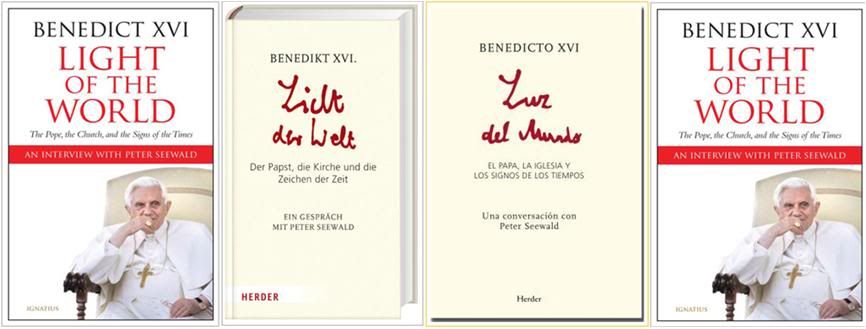 With only two weeks to go until the simultaneous release of Benedict XVI's first interview book as Pope in a dozen languages, Herder publishers facilitated an interview with Peter Seewald for the Sunday La Vanguardia of Barcelona which came out on the day the Pope dedicated the Basilica of Sagrada Familia. Here is a translation....
'With the Pope, you can laugh out loud -
With only two weeks to go until the simultaneous release of Benedict XVI's first interview book as Pope in a dozen languages, Herder publishers facilitated an interview with Peter Seewald for the Sunday La Vanguardia of Barcelona which came out on the day the Pope dedicated the Basilica of Sagrada Familia. Here is a translation....
'With the Pope, you can laugh out loud -
he has a great sense of humor!'
Interview with Peter Seewald
by RAFAEL POCH
Translated from

Nov. 7, 2010
Bavarian journalist Peter Seewald is considered to be Joseph Ratzinger's principal biographer. Seewald, who lives in Munich, was born in 1954 to a Catholic family in Passau. As a teenager, he was influenced by the 1968 leftist movement in Germany, which led him to leave the Catholic Church at age 19.
He started as a journalist by writing for a leftist weekly in Passau, and later began working for established periodicals like the weekly magazines Der Spiegel and Stern and the newspaper Sueddeutsche Zeitung. In 1983, he started to concentrate his writing as a journalist and book author on religion.
In 1996, he published his first book with then Cardinal Joseph Ratzinger, Salt of the Earth, which was based on several days of interviews with the cardinal. The experience led him to return to his Catholic faith. A second interview book with the cardinal, God and the world, was published in 2000. Both books have since been translated into 25 languages.
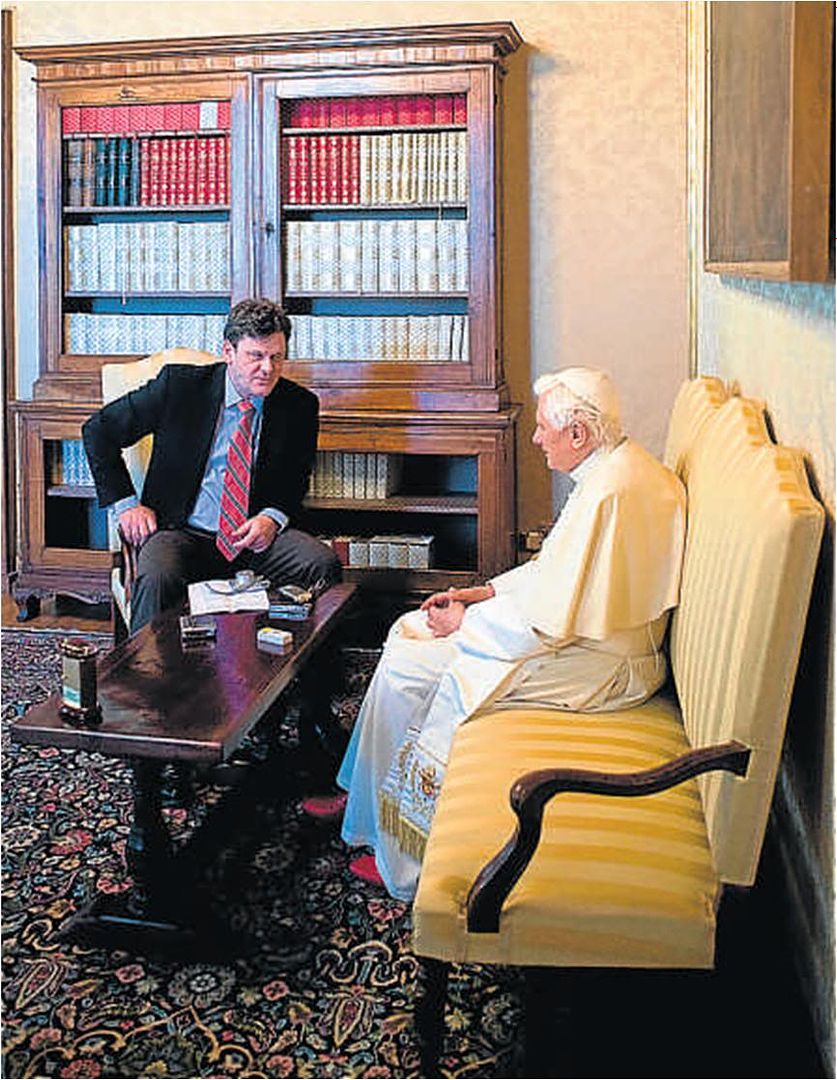
Last summer, Seewald was given another series of interviews over a week with the now Pope, at the papal residence in Castel Gandolfo, resulting in the third interview book, Light of the world, which is coming out this month in 12 language editions.
It is the first time that Papa Ratzinger answers specific questions about his Pontificate, including his own assessments of it and about the 'sex abuse scandal' in the Church.
You have had long conversations with Joseph Ratzinger for these three interview books. Could you describe him as a person?
It is not easy to sketch his portrait. Some do not know him at all because they just do not like him, while many have an idea of him that is based on media accounts that often have meager information. But the fact is that when people have an opportunity to observe him in person, as what happened recently in the United Kingdom, they get a completely different image from the prefabricated one found in often hostile media reports.
For almost 20 years now, I have dedicated myself exhaustively to his biography and to following his life, what he says and what he does, and I can say that he is truly an extraordinary person with extraordinary charisma.
As a professor, he explained the Gospel with such freshness that some of his students say it was almost as if Jesus himself was in the lecture hall.
As prefect for the doctrine of the faith, he conveyed the authoritativeness of having a knowledge of modernity in a very detailed manner and of confronting it with the truth of Christianity.
He likes to say that faith should and can be explained because it is reasonable...
He has a brilliant mind, and is certainly the greatest thinker in our day. But his high intellect is united to a profound piety. He can scale the highest intellectual peaks while keeping his feet firmly on the ground, thanks to his upbringing in Bavarian Catholicism.
He is not among those who do not practice what they preach [the idiom used translates literally as 'who preaches water but drinks wine'] but someone who is holy and humble, and who is authentic because he says what he thinks and does what he says.
Those who know him see him as a very amiable person, very wise but humble, and very open and modern, someone who keeps himself youthful even at his age. Sometimes, he can be too reserved and overly cautious. And he is not the kind to engage in back-slapping familiarity, but he is extraordinarily loyal and still retains and maintains his friendships from his student years.
What I most admire in him is his simplicity combined with courage. He will tolerate discomfort without allowing himself to be bothered. by it. He is almost always right in his analyses and judgments. He also has a great sense of humor - with him you can laugh your guts out!
A change of responsibilities can determine a lot. Was the cardinal very different from the Pope now? Have you noted any changes?
He did not want to be a bishop but he had to accept it. He did not want to be in the Roman Curia but he had to accept it. He did not want to be Pope, but he had to take on the office in which it was clear he would have to suffer very much.
Just think of the enormous efforts that being Pope demands. Think of the weight of all the abuses committed in the Church that have been uncovered. He has wept with some victims and is shamed by the filth that there is in the Church.
And yet he carries these burdens with impressive self-possession and calm, because he knows - as he often says - that he cannot do everything nor should he. [You do all you can and then you trust in God for the rest, he often tells his priests.]
After a giant figure like Karol Wojtyla, nobody thought there could be a succession without ruptures. But Ratzinger achieved that. He governs the Church with a style characterized by collegiality, dialog and humility.
Above all, he teaches, tirelessly and patiently, how to rediscover the faith - not as a system of theories, but as an invitation to undertake a personal relationship with God.
In short, he does not act like a prince of the Church before whom one must tremble, but a servant of the Church, a great steward who devotes himself completely to his mission.
Has he changed? Of course, his present function gives him a special aura, but in his essence, in his conduct, in what he does and what he considers right, Joseph Ratzinger has not changed, but one might say he has been perfecting himself.
I believe that his task as the Successor of Peter has brought his personality, his talents and his charism to maximum fulfillment.
What are the things that cause him most suffering and concern?
I think it is the evaporation of faith in large parts of the Western world and the increasing alienation from God that results from it.
The crisis in the Church is another. The lack of commitment, and above all, the cases of sexual abuse that have cast a cloud over his pontificate. On the other hand, the crisis in society. And of course, both crises are related.
At various times in the past, there have been attempts to declare that God is dead, especially when there are new and tangible golden calves. The Bible is full of such stories. These have less to do with a lack of attraction in the faith than with the power of temptation.
But where can an atheist society that is alienated from God take us? Where can Europe go if she breaks off from her roots? And have not both East and West already gone through such experiments with terrible consequences for the peoples that are torn apart, the chimneys in the concentration camps, and the killing fields of the Soviet gulags?
This Pope has taken on, as no one has before him, all the failures, mistakes and sins of the Church, but he also calls attention to the aberrations of society and the dangers of continuing with such aberrations.
Atheism is not necessarily inoffensive. Even as a cardinal, Joseph Ratzinger warned against the resulting loss of identity, of orientation and of truth, if ever the new paganism takes control of the thoughts and actions of people. Now, we can observe that those warnings were not unfounded.
Does Ratzinger have a fear of God?
Doesn't every believer? But as he has revealed himself to us in Christ, God is a loving being, who pardons, who reconciles, and gives freedom, who knows the needs of every creature, and who emptied himself out of love to the point of dying on the Cross.
God made himself 'small', to the measure of man, so we can understand him, but nonetheless, he remains incomprehensible in his mystery and infinite grandeur, as well as in his power, which can get to be frightening.
Once I asked Joseph Ratzinger if he sometimes did not feel fear of God. And he answered, "I would not call it fear since we know that Christ is God and that he loves us". But he points out that since God accepts man with all his weaknesses, "as a priest, I always try to maintain that ardent feeling that God has an idea of who I am, what I can do, what I can give"... Well, now we know, at least, what idea God had of him...
How does he see mankind in this new century?
One cannot miss the fact that at the start of the third millennium, mankind finds itself in an upheaval of enormous proportions, with all the complex problems of the environment, of the crisis in the financial economy, of the collapse of society.
Christians have been reproached that their religion is an illusory world, but now we are seeing all the truly illusory worlds: the mirage of the financial markets, of the communications media, of fashion and of flashy lifestyles.
We see an unchecked banking system that can wipe out entire national patrimonies. The obsession of 'optimization' at any cost, the total absence of scruples, human 'brutalization' through the advertising and entertainment industries - these are the things that literally make our society sick.
We should ask ourselves when is progress truly progress? Should we continue doing all that we can possibly do just because we can do it? And if we look to the future, how will future generations deal with the problems which we are passing on to them? Will they have a strong and solid base to overcome the chaotic times that await them?
In the new book, Benedict XVI expresses his active concern for all this. His message is a dramatic call to the Church and to the world, to everyone! "We cannot go on this way!"
Mankind finds itself at a crossroads, we took a wrong turn, it's time to reflect. The time has come for fundamental change, for repentance, and he continues, "There are so many problems that must be solved, but they cannot be resolved until and unless God is placed back at the center and made visible in the world..."
Christianity Is not out of time, he says - on the contrary, it can be discovered anew. The revelation of Jesus gives strength and hope. It is the basis for formulating a vision of the future for a society that wants salvation from the verge of self-destruction, by reflecting on firm and reliable values.
How does he himself see the mission of his Pontificate?
He himself said that he began his ministry with the idea "to make clear that the Word of God must be maintained it all its grandeur and purity, in such a way that it cannot be broken by constant changes in tastes".
His principal commitment is to the renewal of the Church. "The Church and her members need constant cleaning", he wrote in his book on Jesus. "Those who have made themselves too big must return to the simplicity and the poverty of the Lord".
What he wants is that after the terrible abuses and aberrations that have occurred, the Church should subject herself to a kind of deep cleansing. After so many sterile debates and so much self-absorption by individuals, it is essential to return to the mystery of the Gospels, to get to know Jesus Christ in his complete and cosmic grandeur. But purification is a difficult process that has its enemies within the church.
For today's lifestyles, positions such as those that the Church defends have been turned into a great provocation. We have become accustomed to considering traditional attitudes and behavior as something that must be broken with, in favor of cheap and current tendencies.
"Pray for me so that I may not flee from the wolves", he asked when he began his Petrine ministry. At the same time, he trusts that the era of relativism, in which nothing beyond one's own self is recognized as valid, is coming to an end.
In fact, there is a significant growth in the numbers of those who are coming to value the Church not just for its liturgy but also for its resistance. There appears to be a clear change of consciousness from mere compliance with appearances to taking Catholic practices seriously and living one's religion with authenticity.
But in the mission of this Pontificate, there are many great goals, as for instance in the ecumenical field, in inter-religious dialog, but above all, int he re-evangelization of the West.
Nevertheless, for this Pope, the essential is to show God anew to men, to tell them the truth, the truth about the mysteries of creation, the truth about human existence, and the truth about Christian hope that goes far beyond the merely earthly.
What do you think are the most difficult moments Joseph Ratzinger has experienced in his personal life?
There have been many, without a doubt. He comes from a family that was anti-Nazi and had a difficult life during the Nazi years. We have his memories of the war that he lived as a youth conscript from age 14, his time as a prisoner of war, and the difficult early postwar years. As a child, he almost drowned in a pond, and later he survived a potentially lethal infection during the war.
A great shock for him was the possibility that his Habilitation dissertation [to qualify him to be a university professor] would not pass because his thesis adviser thought his ideas were too 'modern'. Fear of failure was all the more serious because he had already brought his parents to live with him in the expectation of being able to take care of them [with his salary as a professor]...
Then there were the deaths of his parents, and much later, of his beloved sister Maria.
And just when he had settled into the academic world of Regensburg and thought he could look forward to the theologian-scholar's life that he desired, almost like a blow, there came the nomination to be Archbishop of Munich by Paul VI.
And it could not have been easy to spend almost 25 years at the CDF being 'bad cop', being the scapegoat for everyone who had a grievance against the Church, and being considered a Panzerkardinal which he never was...
But after all that, the most difficult moment for him would have to be when they were counting the votes at the Conclave. He was looking forward to retirement. he certainly did not want to be Pope. As he himself said, he thought of his election like a guillotine poised over his head.
Do you think that being German has introduced some significant personal nuances into his Pontificate?
As a Bavarian, he is not necessarily a typical German, but he has brought to his office some characteristics attributed to Germans, such as precision, reliability, perseverance and diligence.
Of course, there is also a historical slant. For almost a thousand years, the Germans were a pillar of the Holy Roman Empire. And the profound exploration of human knowledge, such as that embodied by Meister Eckhart, Goethe, Kant, Hegel, is one of the fundamental characteristics of the German people.
But Germany was also the land of religious schisms, the cradle of scientific Communism, and not the least, the setting for a diabolical regime that decreed the extermination of the Jews.
Ratzinger became the first German to be Pope in 500 years. If we consider that two great schisms within the Church each took place under a German Pope, it is all the more remarkable that there is such a clear desire for Christian unity in Benedict XVI's Pontificate.
In almost a thousand years, there had been no great progress in relationships between the Roman and Orthodox churches, until now. At the same time, relations between the Vatican and Israel are better than ever, as President Shimon Peres said recently.
The Pope views the circumstance that he is German more as a point of reflection. God willed that a German professor would become Pope at this time, to bring to the fore the unity between reason and faith.
It seems to me a magnificent thing that in an age when no value is recognized as supreme, which so often prescribes falsehood and even pure lies, at a time when frequently the blind lead the blind, we have a Pope whose voice and integrity are sure indicators of the way to go.
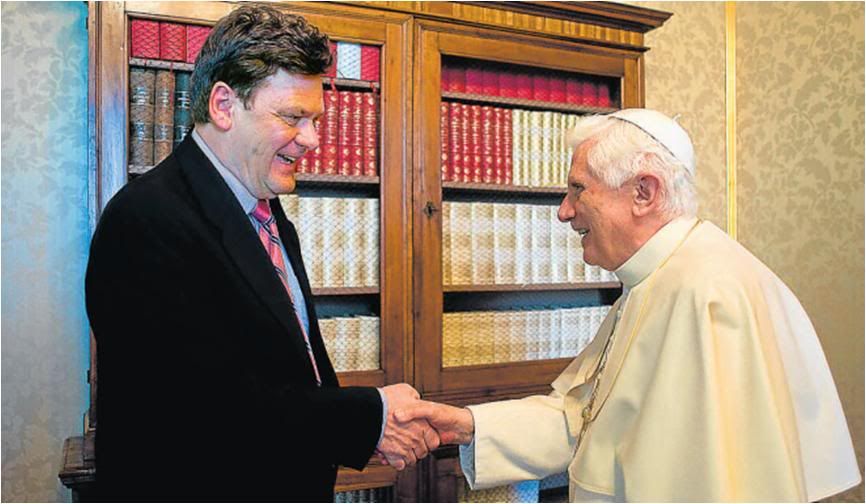
[Modificato da TERESA BENEDETTA 11/11/2010 13:41] |
| |
 11/11/2010 10:52 11/11/2010 10:52 |
|
| | | OFFLINE | | Post: 21.414
Post: 4.050 | Registrato il: 28/08/2005
Registrato il: 20/01/2009 | Administratore | Utente Master | |
|

 The Pope writes G20 leaders:
The Pope writes G20 leaders:
The world is watching you
Translated from the 11/11/10 issue of

A summit meeting with global importance but also "an eloquent sign of the relevance and resposibility acquired b Asia on the international scene at the start of the 21st century" is how Benedict XVI characterized the G20 meeting which opens today in Seoul, South Korea, in a message to South Korean President Lee Myung-bak.
To His Excellency
Mr. Lee Myung-bak
President of the Republic of Korea
Mr. President,
The meeting about to take place in Seoul of Heads of States and Government of the world's twenty-two leading economies together with the Secretary-General of the United Nations Organization, the Presidency of the European Union and some regional Organizations, as well as the leaders of various specialized Agencies, is not only of global importance but also clearly expresses the significance and responsibility which Asia has acquired on the international scene at the beginning of the 21st century.
The Korean Presidency of the Summit is a recognition of the significant level of economic development attained by your country, which is the first among those not belonging to the G8 to host the G20 and guide its decision in the world after the crisis.
The Summit seeks solutions to quite complex questions, on which the future of upcoming generations depends and which therefore require the cooperation of the entire international community, based on the acknowledgement - which is shared and agreed by all peoples - of the primary and central value of human dignity, the final objective of the choices themselves.
The Catholic Church, in accordance with her specific nature, regards herself as involved and shares the concerns of the leaders who will take part in the Seoul Summit.
I therefore encourage you to tackle the numerous serious problems facing you - and which, in a sense, face every human person today - bearing in mind the deeper reasons for the economic and financial crisis and giving due consideration to the consequences of the measures adopted to overcome the crisis itself, and to seek lasting, sustainable and just solutions.
In doing so, it is my hope that there will be a keen awareness that the solutions adopted, as such, will work only if, in the final analysis, they are aimed at reaching the same goal: the authentic and integral development of man.
The world's attention focuses on you and it expects that appropriate solutions will be adopted to overcome the crisis, with common agreements which will not favor some countries at the expense of others.
History, furthermore, reminds us that, no matter how difficult it is to reconcile the different socio-cultural, economic and political identities coexisting today, these solutions, to be effective, must be applied through combined action which, above all, respects the nature of man.
It is decisive for the very future of humanity to show the world and history that today, thanks also to this crisis, man has matured to the point of being able to recognize that civilizations and cultures, like economic, social and political systems, can and must converge in a shared vision of human dignity, which respects the laws and requirements placed in it by God the Creator.
The G20 will respond to the expectations placed in it and grant real success to future generations, if taking into consideration the various and sometimes contrasting problems afflicting the peoples of the earth, it is able to set out the characteristics of the universal common good and demonstrate its willingness to cooperate in order to attain it.
With these sentiments I invoke God's blessings on all taking part in the Seoul Summit and I avail myself of the occasion to renew to Your Excellency the assurance of my highest consideration.
From the Vatican
8 November 2010

Pope to G20 leaders:
The world is watching
VATICAN CITY, Nov. 11 (AFP) - Pope Benedict XVI on Wednesday urged world leaders to work together for 'lasting, sustainable and just' solutions to the global economic crisis, on the eve of the G-20 summit in South Korea.
Writing in Osservatore Romano, the official Vatican daily, the Pope said the leaders of 20 of the world's leading economies should respect 'human dignity' and avoid policies that favour some countries over others. [The text of the letter was published in OR - the letter itself was sent to the President of South Korea, yet this article does not mention it at all! How is it possible for a major news agency to mess up something so simple?]
'The world is watching you,' read the headline of the Pope's message. 'The Catholic Church ... regards herself as involved and shares the concerns of the leaders who will take part in the Seoul summit,' he said.
'I therefore encourage you to tackle the numerous serious problems facing you ... to seek lasting, sustainable and just solutions,' he added.
He also called for world leaders to demonstrate that 'civilisations and cultures ... can and must converge in a shared vision of human dignity, which respects the laws and requirements placed in it by God the Creator'.
'The G-20 will respond to the expectations placed in it... if it is able to set out the characteristics of the universal common good and demonstrate its willingness to cooperate in order to attain it.'
[Modificato da TERESA BENEDETTA 11/11/2010 13:43] |
| |
 11/11/2010 14:45 11/11/2010 14:45 |
|
| | | OFFLINE | | Post: 21.415
Post: 4.051 | Registrato il: 28/08/2005
Registrato il: 20/01/2009 | Administratore | Utente Master | |
|
 Nov. 11, Thursday, 32nd Week in Ordinary Time
Nov. 11, Thursday, 32nd Week in Ordinary Time
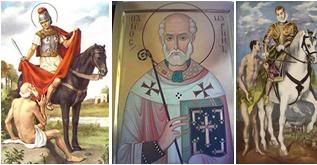 ST. MARTIN DE TOURS (born Hungary 316?-d France 397)
ST. MARTIN DE TOURS (born Hungary 316?-d France 397)
Bishop and Confessor, Patron of France
Son of a Hungarian soldier in the Roman Empire, he grew up in the area that is now Pavia, Italy,
and joined the cavalry at 15. At 18, he had his famous dream of giving half his cloak to a beggar
who turned up later as Christ wearing it. He was baptized, and two years later, he left the army
to be a 'soldier for Christ'. In Tours, France, he became a disciple of Hilary of Poitiers. He went
into exile and back with Hilary, establishing the first French monastery on their return. He was
active in preaching against the various heresies of his time. He was named bishop by popular
acclaim on Hilary's death, and continued to fight paganism and heresies. In the 7th century,
his cult was taken up by Clovis, who founded what became the Merovingian dynasty. His shrine
became a popular stop on the pilgrimage route to the Shrine of St. James in Compostela, Spain,
and he has remained one of the most popular of European saints. Martin Luther, who was baptized
on his feast day, was named for him.
Readings for today's Mass:
www.usccb.org/nab/111110.shtml
OR today.
 The main headline is on the Holy Father's letter to the President of South Korea, as host and President of the G20 summit which begins in Seoul today [See text in the post above]. The issue carries the texts and photos from his General Audience yesterday, in which he reported on his weekend visit to Spain; and after the release today of his long-awaited Post-Synodal Apostolic Exhortation entitled Verbum Domini following the 2008 General Assembly on the Word of God, the OR announces it will be carrying the full text as a free supplement to the issue tomorrow. Page 1 international news: Terrorist bombs planted in various Christian houses in Baghdad take 6 lives, including a 4-year-old, and wounds 30 others; China and the USA face each other at G20 summit over monetary policy
The main headline is on the Holy Father's letter to the President of South Korea, as host and President of the G20 summit which begins in Seoul today [See text in the post above]. The issue carries the texts and photos from his General Audience yesterday, in which he reported on his weekend visit to Spain; and after the release today of his long-awaited Post-Synodal Apostolic Exhortation entitled Verbum Domini following the 2008 General Assembly on the Word of God, the OR announces it will be carrying the full text as a free supplement to the issue tomorrow. Page 1 international news: Terrorist bombs planted in various Christian houses in Baghdad take 6 lives, including a 4-year-old, and wounds 30 others; China and the USA face each other at G20 summit over monetary policy.
THE POPE'S DAY
The Holy Father met today with
- 12 Brazilian bishops from Southern Sector-II who are on ad limina visit. Individual meetings.
- Mons. Gerhard Mueller, Bishop of Regensburg.
- Participants in the Plenary Assembly of the Pontifical Committee for International Eucharistic Congresses.
Address in Italian.
At a news conference today, Cardinal Marc Ouellet, Prefect of the Congregation for Bishops, led a presentation
of Benedict XVI's Post-Synodal Apostolic Exhortation, Verbum Domini, summarizing pastoral recommendations
based on the General Assembly of the Bishops Synod in October 2008 on The Word of God.
The Vatican has released the texts of the Holy Father's letters to
- The President of the Republic of Korea, on the occasion of the G20 summit this week; and
- President Ahmadinejad of Iran, which was hand delivered to him by Cardinal Jean-Louis Tauran, president
of the Pontifical Council for Inter-Religious Dialog, who is in Tehran with a delegation for a periodic
meeting with their Iranian counterparts on the Catholic-Muslim dialog.
- Cardinal Raffaele Farina, Archivist and Librarian of the Holy Roman Church, on the re-opening of
the Vatican Library and Archives this month after three years of renovation.
Verbum Domini is bound to be one of the most significant documents of this Pontificate... I'm gasping for breath from the embarrassment of riches coming to us steadily from the Magisterium of Benedict XVI, who has made an art form of his pastoral and spiritual messages, whether it is a book, an encyclical, a homily, a post-Synodal exhortation, a simple letter, whatever! Thank you, Holy Father, and AD MULTOS ANNOS!
 Il Foglio today has a seven-page story intended as a sort of 'preview' to LIGHT OF THE WORLD elicited in a long interview with Peter Seewald, who is carefully guarded about not laying out any specifics... The only real 'novelty' that he lets through is on the Regensburg lecture, about which the Pope admits he never thought it would be considered other than what he meant it to be - an academic lecture, not a political discourse.
Il Foglio today has a seven-page story intended as a sort of 'preview' to LIGHT OF THE WORLD elicited in a long interview with Peter Seewald, who is carefully guarded about not laying out any specifics... The only real 'novelty' that he lets through is on the Regensburg lecture, about which the Pope admits he never thought it would be considered other than what he meant it to be - an academic lecture, not a political discourse.
[Modificato da TERESA BENEDETTA 13/11/2010 17:09] |
| |
 11/11/2010 15:28 11/11/2010 15:28 |
|
| | | OFFLINE | | Post: 21.416
Post: 4.052 | Registrato il: 28/08/2005
Registrato il: 20/01/2009 | Administratore | Utente Master | |
|

 Following is the text of the letter sent in English by the Holy Father to the President of Iran and hand-delivered Monday by Cardinal Jean-Louis Tauran, president of the Pontifical Council for Inter-Religious Dialog, who is in Tehran for a periodic meeting with Islamic counterparts.
Following is the text of the letter sent in English by the Holy Father to the President of Iran and hand-delivered Monday by Cardinal Jean-Louis Tauran, president of the Pontifical Council for Inter-Religious Dialog, who is in Tehran for a periodic meeting with Islamic counterparts.

To His Excellency Mahmoud Ahmadinejad
President of the Islamic Republic of Iran
Mr President,
I am writing to acknowledge the courteous words of greeting and the reflections that Your Excellency kindly sent me by the good offices of His Excellency Mr Hojjat ol Eslam Haj Sayyed Mohammad Reza Mir Tajjadini, Vice President of the Islamic Republic of Iran.
It is my profound conviction that respect for the transcendent dimension of the human person is an indispensable condition for the construction of a just social order and a stable peace. Indeed, one’s relationship with God is the ultimate foundation for the inalienable dignity and sacred character of every human life.
When the promotion of the dignity of the human person is the primary inspiration of political and social activity that is committed to search for the common good, solid and enduring foundations are created for building peace and harmony between peoples.
Peace is, above all, a gift from God, which is sought in prayer, but it is also the result of the efforts of people of good will. In this perspective, believers of every religion have a special responsibility and can play a decisive role, cooperating in common initiatives. Inter-religious and intercultural dialogue is a fundamental path to peace.
Strongly convinced of this, the recent Special Assembly for the Middle East of the Synod of Bishops, which took place in the Vatican from 10 to 24 October 2010, was a significant moment of reflection and sharing on the situation in the Middle East and on the great challenges placed before the Catholic communities present there.
In some countries these communities face difficult circumstances, discrimination and even violence and they lack the freedom to live and publicly profess their faith. I am certain that the work of the Synod will bear good fruit for the Church and for the whole of society.
The Catholics present in Iran and those around the world make efforts to collaborate with their fellow citizens to contribute loyally and honestly to the common good of the respective societies in which they live, becoming builders of peace and reconciliation.
In this spirit, I express the hope that the cordial relations already happily existing between the Holy See and Iran will continue to progress, as well as those of the local Church with the civil authorities.
I am also convinced that the launch of a bilateral Commission would be especially helpful in addressing questions of common concern, including that of the juridical status of the Catholic Church in the country.
With these sentiments, I avail myself of the occasion to renew to you, Mr President, the assurance of my highest consideration.
From the Vatican
3 November 2010

[Modificato da TERESA BENEDETTA 11/11/2010 16:41] |
| |
 11/11/2010 17:39 11/11/2010 17:39 |
|
| | | OFFLINE | | Post: 21.417
Post: 4.053 | Registrato il: 28/08/2005
Registrato il: 20/01/2009 | Administratore | Utente Master | |
|

 In 'VERBUM DOMINI', Pope Benedict XVI
In 'VERBUM DOMINI', Pope Benedict XVI
summarizes and annotates propositions from
the 2008 Synod on 'The Word of God'

Nov. 11, 2010
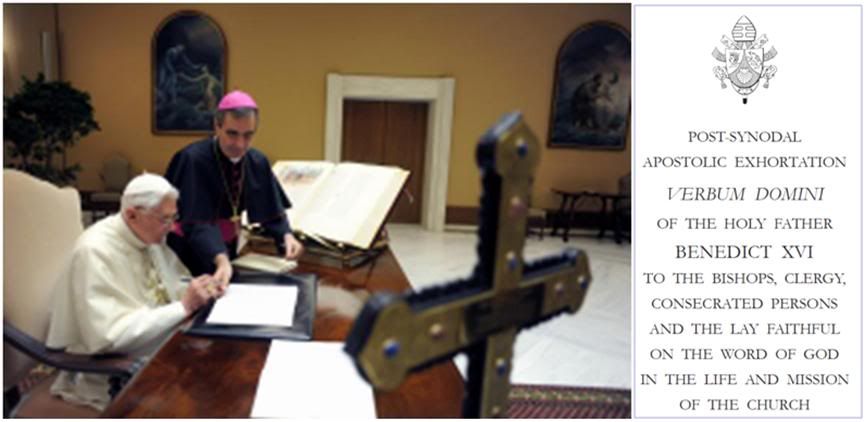 The Holy Father, seen here with Mons. Nikola Eterovic, secretary-general of the Bishops' Synod, signs the Apostolic Exhortation.
Verbum Domini
The Holy Father, seen here with Mons. Nikola Eterovic, secretary-general of the Bishops' Synod, signs the Apostolic Exhortation.
Verbum Domini, a 200-page booklet bringing to a conclusion the work of the 2008 synod of bishops on ‘The Word of God in the Life and Mission of the Church’ was made public at a press conference in the Vatican on Thursday.
Signed by Pope Benedict on September 30th, the title of this post-synodal apostolic exhortation is a deliberate reference to one of the key Vatican II documents Dei Verbum and sheds light on the past four decades of theological, pastoral and practical reflection on the centrality of the Scriptures in the life, the liturgy and the witness of all Christian Churches.
Available in 8 languages including Latin, the document also highlights the interconnectedness of the Old and New Testaments and strongly encourages reading, reflecting and studying the Bible as a key method of promoting ecumenical and interfaith dialogue.
At the heart of the document, as the synod fathers discussed during their three week meeting in October 2008, is the idea that the Incarnation – the Word made Flesh – is central to our understanding of the Bible.
Secondly, the essential mission of the Church is to translate that Living Word of God, in creative ways, into the new languages and cultures that can touch the hearts of men and women today.
Following the press conference, Philippa Hitchen spoke with Canadian Cardinal Marc Ouellet, relator general at the synod on ‘The Word of God".
Cardinal Oullet says this is a very significant and valuable document for the whole Church: "The Holy Father was very involved in the discussions during the synod and we see that in the document".
He said the synod "was really focusing on what is more fundamental in the Church, the Word of God which is the basic of the existence of the Church, so there was a great unity among the synod fathers and this is reflected in this document."
He also believes it will have a very positive impact: "I think it will foster more interest, more love for the reading of the Sacred Scriptures".
The Cardinal goes on to underline the vital importance of possessing a good knowledge of the Word of God: "There should be more interest in the bible in order to understand art, literature, we need to know the bible and to know how the faith has forged the identity of not only the Church but also ... our whole culture." "So, it's my hope this document will be well received at all levels".
Major new papal document on Scripture:
As always, Pope Benedict surprises us
Verbum Domini's 200 pages cover how to harmonize academics with faith,
how to read Scripture with the saints, and more...
by CAROL GLATZ

VATICAN CITY, Nov. 11 — God constantly tries to enter into dialogue with the people he created — speaking through creation and even through silence, but mainly in the Church through the Bible and through his son Jesus Christ, Pope Benedict XVI said.
In his apostolic exhortation, Verbum Domini (“The Word of the Lord”), the pope encouraged Catholics to embrace and value each of the ways God tries to speak to humanity.
The document, a papal reflection on the conclusions of the 2008 Synod of Bishops on the Word of God, was released at the Vatican Nov. 11 and emphasized the need to improve Catholics’ familiarity with the Bible and with the need to read and understand it in harmony with the Church.
The Bible is not a dusty collection of ancient writings addressed only to ancient peoples, he said. But it’s also not some sort of private letter addressed to individuals who are free to interpret it any way they please, the Pope said in the document, which is close to 200 pages long.
The Pope said that with Verbum Domini, “I would like the work of the synod to have a real effect on the life of the Church: on our personal relationship with the sacred Scriptures, on their interpretation in the liturgy and catechesis, and in scientific research so that the Bible may not be simply a word from the past, but a living and timely word.”
Pope Benedict asked for greater Church efforts to teach Catholics about the Bible, to help them learn to read it and pray with it, to treat it with great dignity during the liturgy and emphasize its importance by making sure homilies are based on the day’s readings.
For centuries, Catholic laity actually were discouraged from reading the Bible themselves. Even though that began changing 100 years ago, Bible reading often is seen as a Protestant activity.
In fact, some evangelical Christians use passages from the Bible to preach against the Catholic Church, which the Pope said is truly ironic since “the Bible is the Church’s book.”
It was the Church that decided which of the ancient Christian writings were inspired and were to be considered the New Testament, the Pope said. And it was the Church that interpreted it for hundreds of years.
“The primary setting for scriptural interpretation is the life of the Church,” he said, not because the Church is imposing some kind of power play, but because the Scriptures can be understood fully only when one understands “the way they gradually came into being.”
Obviously, he said, the key message of the Bible — the story of God’s love for his creatures and the history of his attempts to save them — can be grasped only if people recognize that the fullness of God’s word is Jesus Christ.
Jesus “is the definitive word which God speaks to humanity,” the Pope wrote, and “in a world which often feels that God is superfluous or extraneous, we confess with Peter that he alone has ‘the words of eternal life.’“
The Scriptures themselves teach that God created human beings with a special dignity, giving them intelligence and free will. In approaching the Scriptures, he said, people must use that intelligence to understand what is written.
Pope Benedict, a theologian who served for more than 20 years as president of the Pontifical Biblical Commission, said academic approaches to Scripture studies were essential for helping people understand the Bible, as long as those studies recognize that the Bible is not simply a piece of literature.
For example, he said, a lot of Catholics — including priests giving homilies — are completely at a loss when dealing with “those passages in the Bible which, due to the violence and immorality they occasionally contain, prove obscure and difficult.”
Those passages, he said, demonstrate that “God’s plan is manifested progressively and it is accomplished slowly, in successive stages and despite human resistance. God chose a people and patiently worked to guide and educate them.”
God’s education of his people continues today, for example, by helping people understand the importance of safeguarding creation and working for more justice in social and political systems, he said.
Pope Benedict said God’s dialogue with humanity through the Bible must lead to greater faith and a more powerful witness in the world.
While the papal exhortation mentioned plenty of early Church theologians and their approaches to understanding Scripture, it also included a long section about men and women who read the Bible and were inspired to live its message in the world.
“Every saint is like a ray of light streaming forth from the word of God,” he said, listing personalities ranging from St. Clare of Assisi to Blessed Teresa of Calcutta and from St. Dominic to St. Josemaria Escriva de Balaguer, the founder of Opus Dei.
Some of the Bible’s lessons are old but need to be given new attention, Pope Benedict wrote.
The Scriptures make it clear that the family founded on marriage is part of God’s plan for humanity and for human happiness.
“In the face of widespread confusion in the sphere of affectivity, and the rise of ways of thinking which trivialize the human body and sexual differentiation, the word of God reaffirms the original goodness of the human being, created as man and woman and called to a love which is faithful, reciprocal and fruitful,” he wrote.
The Bible, the Pope said, is filled with words of consolation and joy, but as God’s word it also is “a word which disrupts, which calls to conversion.”
The complete English text is available on
www.vatican.va/holy_father/benedict_xvi/apost_exhortations/documents/hf_ben-xvi_exh_20100930_verbum-domin...
[Modificato da TERESA BENEDETTA 11/11/2010 19:45] |
| |
 11/11/2010 17:52 11/11/2010 17:52 |
|
| | | OFFLINE | | Post: 21.418
Post: 4.054 | Registrato il: 28/08/2005
Registrato il: 20/01/2009 | Administratore | Utente Master | |
|

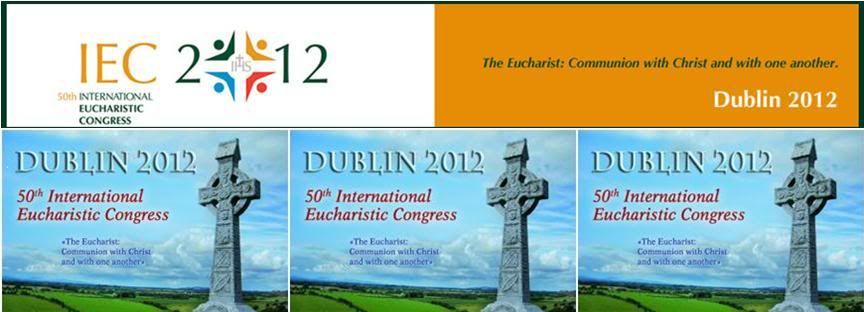 Dublin 2012 Eucharistic congress
Dublin 2012 Eucharistic congress
and Church renewal in Ireland

11 NOV 2010 (RV) - The International Eucharistic Congress, due to take place in Dublin, in June 2012, fits perfectly into the program for the modernisation of the Church in Ireland, Pope Benedict XVI said Thursday as he greeted participants at the Plenary Assembly of the Pontifical Committee for International Eucharistic Congresses.
National delegations from across the globe gathered this week to discuss preparations for Dublin 2012, when the Archdiocese will open its doors, chapels and churches to all those who want to take part in the week-long event, centred on the theme "The Eucharist, communion with Christ and with one another”.
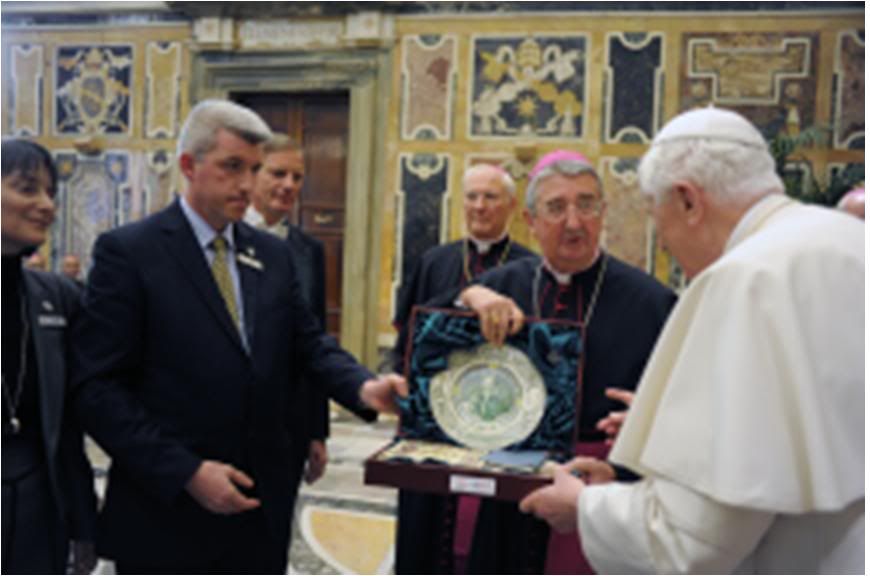 Mons. Martin presents the Pope with preliminary materials for the 2012 Congress.
Mons. Martin presents the Pope with preliminary materials for the 2012 Congress.
The Irish delegation was led by the Archbishop of Dublin, Diarmuid Martin, and speaking to them Thursday the Pope observed, “your Assembly has paid great attention to this event, which is also part of the modernization program of the Church in Ireland. The theme recalls the centrality of the Eucharistic Mystery for the growth of the life of faith and every authentic process of church renewal”.
Pope Benedict also remarked that this week’s meeting falls on the 50th anniversary of the Eucharistic Congress in Munich, Bavaria, which marked a turning point in understanding these ecclesial events, and which the Pope said “I had the pleasure of attending ... in person, as a young professor of theology”.
In addition, the 2012 Congress in Dublin will have a jubilee character, as it will be the 50th global gathering, and it will also be 50 years since the opening of the Second Vatican Council.
Tracing the long history of International Eucharistic Congresses, the Pope said “through the characteristic formula of the "statio orbis”, they emphasize the universality of the celebration: in fact, it is always a celebration of faith gathered around the Eucharistic Christ, Christ's supreme sacrifice for humanity, which involves the faithful not only of a particular Church or nation, but as far as possible, from all over the globe. It is the Church, which gathers around the Lord”.
“The task of Eucharistic Congresses, especially in the current context”, he concluded “is also to make a distinctive contribution to the new evangelization by promoting mystagogical evangelization, which takes place in the school of the Church in prayer and through the liturgy”.
[Modificato da TERESA BENEDETTA 11/11/2010 18:00] |
| |
 11/11/2010 22:44 11/11/2010 22:44 |
|
| | | OFFLINE | | Post: 21.419
Post: 4.055 | Registrato il: 28/08/2005
Registrato il: 20/01/2009 | Administratore | Utente Master | |
|
 Book watch:
Book watch:
13 days to go
We know that the English edition has been read and briefly reviewed by Archbishop Charles Chaput of Denver, because Ignatius Press uses his review in its blurb for the book. And one imagines that the various publishers would by now have given out the manuscript for review by selected names to be ready for publication when the book is launched. The Vatican publishing house LEV may be lagging behind, because the Italian booksellers advertising the book online still do not have a cover picture, nor does LEV on its own site. But it seems someone at Panorama magazine has seen something of the book - or the manuscript... But so far, I have been unable to find the Panorama article online.

ROME, Nov. 11 (Translated from ASCA)- "We are not a production center, nor are we an enterprise for profit. We are the Church!"
Benedict XVI does not mince words in his new interview book Luce del mondo: Il Papa, la Chiesa e i segni dei tempi, which will be issued simultaneously around the world on November 24, and that Panorama magazine previews in its weekly issue that goes on sale tomorrow.
The reference was to the financial 'scandals' that have swirled around the Vatican bank, but it also applies in general.
The Pope did not draw back from any of the questions posed by the Bavarian journalist Peter Seewald - more than 90 questions, which with the Pope's answers, make up 284 pages in the Italian edition.
Apparently, no one at the Vatican had read Seewald's manuscript - in German, as the interview was conducted in German - other than the Pope himself, who reviewed it carefully; his longtime personal collaborator Ingrid Stampa, who undertook or supervised the Italian translation; and possibly, Cardinal William Levada of the CDF, whom the Pope entrusted with reviewing the text for any possible theological or doctrinal issues. It seems the Pope did not even show it to Cardinal Tarcisio Bertone.
Thus, there is great expectation. The Pope speaks of the pedophile issue, Islam, married priests, divorce, contraception, Church reform, liturgy, relationship with the Orthodox, the Pope's authority... And even about his predecessor, John Paul II.
Panorama says that his answers are never standard nor expected. As when he talks about the Church, saying "We are a community of persons who live in the faith. Our task is not to create a product or make a successful sale".
|
| |
 12/11/2010 00:52 12/11/2010 00:52 |
|
| | | OFFLINE | | Post: 21.420
Post: 4.056 | Registrato il: 28/08/2005
Registrato il: 20/01/2009 | Administratore | Utente Master | |
|

 What the Pope was worth
What the Pope was worth
in revenues from advertising
by Filippo Di Giacomo
Translated from

Nov. 11, 2010
The feast over, the accounting done, it now seems as though to have the Pope as a guest has turned out to be just dandy even for the 'priest-eating' Spanish media.
According to data from the Madrid-based Kantar Media institute, if the Spanish authorities had needed to plan a promotional campaign for the two regions visited by Benedict XVi during his two-day visit this weekend, they would have needed to spend at least 67 million euros.
Kantar's data base showed that the Pope's visit had generated 6,026 separate news reports. Which brought in 67 million euros in revenue to the 327 Spanish media outlets accredited to cover the events in Santiago and Barcelona.
The agency also reports that in both cities, the TV channels earned the most revenue from the visit (37.8 million), followed by the print media (17.2 million) and by radio (11.5 million.
TV also had the primacy of immediacy. The Spanish bishops conference estimated the total TV audience worldwide at more than 150,000 [based on the audiences reached by the TV channels who bought rights to the live broadcasts.]
The highlight of the visit was the dedication of Sagrada Familia - an event made memorable by the coverage itself of Television Espanola (TVE) with surprising tecnological sophistication (3D, 32 cameras, with a ceiling spidercam for unparalleled top views, and several placed at eye level in order to capture details better), and exemplary technical direction which was able to pick up and convey all the symbolic and esthetic significance of the event.
One of the recurrent media tempests during any papal visit abroad concerns the costs of moving around the entire papal party and the apparatus surrounding the Pope, at the expense, it is claimed, of the host country.
Like Madrid's Kantar, analysts in other nations know that whenever a Pope visits anywhere, he brings gains for everybody, including those who are in charge of watching pubic expenditures.
And that to understand the true 'content' of any papal visit, one must get away - before, during and after - from everything said by the so-called religion correspondents and commentators who are incapable of reporting anything that has to do with a papal visit without imposing a political perspective.
They are already starting to transform the coming World Youth Day in Madrid as a kind of redde rationem ['give an accounting', taken from the Gospel story about the rich man who has entrusted his affairs to an administator, and then later calls him to make an accounting of how he administered his assets] between the 'two Spains' - those who pray with the Pope and will fill the city squares, and those who are against him and have staked their claim on the virtual public squares of the media.
In fact, as an editorialist in El Pais wrote, the socialist government in Spain is well aware that to get into an all-out fight with the Church would mean a loss of at least two million votes in any general election.
Perhaps that is why Jose Montilla, secretary-general of the Catalan Socialist Party and president of the regional government (Generalitat), managed during the papal visit to almost simultaneously call a meeting regarding support for 'alternative families' while participating in all the papal events and presenting the Pope with a gift!
In a horizon where even the vice-president of the Catalan government and leader of the Esquerra Republicana de Catalunya (and therefore, political heir of those who in 1931 went from church to church to seek out priests that they could then hang from the meathooks in the local slaughterhouse), praised the Pope after hearing him say Mass prayers in Catalan because, he said "in doing so, the Pope did more for the Catalan language than all the prime ministers of Spain put together", the Pope's visit brought out much that never finds room in media reporting.
Which is that, just as he had in Turkey, in the USA, in Australia, In Israel, In the United Kingdom, the Pope met a people of faith who are for the most part silent weavers of calm and peaceful relations. And that their pastors, like the Bishop of Compostela Julian Barrio and the Archbishop of Barcelona, Lluis Martinez Sistach, continue to express the true pastoral character of the Catholic tradition.
Thanks to the Pope's visit, the two bishops have shown themselves to be what many of our bishops have not managed to become: fecund witnesses of a Church that is capable in a Ratzingerian way of proposing the great themes of the Catholic faith without being tempted to pick a fight nor to dumb it down to the cultural level of contemporary society.
Perhaps, too, one of the paradoxes to which we are being habituated by the Pope's foreign trips is that in order not to feel that he is unheeded and 'isolated', all Pope Benedict XVI has to do is leave the Vatican!
The bad news from Spain is that apparently, the hardcore anti-Church media remained hardcore throughout... That is really troubling. Elsewhere, hardcore media critics had always relented in the actual presence of the Pope, even if they would revert to type soon enough.
The landscape after the visit
Translated from

11/11/2010
We Spanish Catholics have much to reflect upon and much to work on after the pilgrimage of Benedict XVI to Compostela and Barcelona.
The starting point can only be our gratitude to the Pope for his great sacrifice in coming to us to gift us with his personal testimony and preaching, which should determine our path as a Church in the immediate future.
This demands an examination in depth, a willingness to correct ourselves and to change, as well as an educative effort. With emotion but with much intelligence, we must also analyze the climate of cultural hostility that surrounded the visit, especially in the media-cultural complex. Unfortunately, Spain has proven to be different in thhis respect from the rest of Europe.
Let us start from the end. I do not recall any similar climate of aggression (which continues) during any previous papal visit to Spain. News, reportage, interviews opinion pieces, gossip - all fit into a pattern of repugnant sectarianism and hate-filled hostility.
Of course, the seeds had been sown for some time, but now we are starting to see their bitter fruits more clearly. We can say that the mission of much of the media was not to let up in their criticism at all, from the moment the Pope's plane left Rome!
And they found fault with everything: from his accurate description of the historical clash that had taken place in Spain between faith and secularism, to the fact that nuns cleaned up the altar at Sagrada FAmilia and prepared it for Mass [they thought it was demeaning to women that the most obvious 'role' they had in the Mass was to clean up!].
Oscillating beween vulgar manipulation of facts and ideological combat against the Church, all the reporting left hardly any space for what the Pope said, as if the millions who had been following the Pope's visit with such attention deserved no respect at all from these new engineers of public opinion.
I have neither the time nor the inclination to go into details. I shall concentrate on how the attack en masse got started, provoked, it seems, by the Pope's declaration on the need for a new season of dialog between faith adn European secularism.
Benedict XVI was talking about a continental problem that has left its mark in the last few centuries on European culture, and he was advocating that it is time to go beyond it. He referred to the tragic consequences of that clash in 1930s Spain {it is not as if he lied or was making wild claims), but he did not assign blame. Rather, he proposed - as he did in Westminster Hall, to the applause of the top representatives of British society - a new kind of encounter, a new dialog between Christianity and secular reason. And that was enough to trigger off the reaction, because there are secular sectors who are not interested in dialog at all but simply in extirpating Catholicism.
Both his historical discourses - at Plaza Obradoiro and at Sagrada Familia - were taken by his critics to mean that the Pope was attacking Zapatero's secularism and preaching against abortion, etc. Either one could well have occurred, but a review of both texts shows it was not so at all.
Zapatero was nowhere, not even in the substrates, in either speech, and as for abortion, all Benedict XVI did was to proclaim the value and dignity of every human life. He said three lines about this, and all of it positively.
His critics are not blind, but they prefer not to see. And the more open and cordial Benedict is in offering his embrace, the more it feeds their grudges and need for aggression.
For all that, there is no possible alternative to Benedict XVI's proposal for dialog - it's the only one that is worth supporting, and it is the method of his new evangelization.
But we must not ignore the 'reduction' of his visit by part of the Catholic world in a way that is almost a reflection of what is happening among the radical secularists.
For some of these militants, the Pope had come to un-bury the hatchet of war against Zapatero's policies and to stir up a combative dialectic with the enemies of Christianity. Others saw his homilies simply as denunciations of abortion and euthanasia [even if he never used those words], or simply as a defense of marriage and family values.
On the other hand, having read and reread his texts and having attentively followed every step he took in Santiago and Barcelona, I must say in all sincerity that the visit left me stunned with amazement.
Because I believe that never until this trip has any Pope appealed in such a way to the thirsty heart of a disoriented generation, showing them that man cannot give himself life, nor can he save and bring it to fulfillment by himself alone.
Benedict XVI has called on the Church to accompany contemporary man in his labored search for meaning and has reminded him that not all the good and beautiful things in the world will satisfy him, that his goal must be to find God, who is a friend to everyone.
As eloquent signs of God's friendship, he pointed to the imposing beauty of Sagrada Familia and the no less imposing example of Christian charity at the Centro Nen Deu.
The mission that the Pope urges on us is not to reinforce our armies for a reconquest of Europe. It consists in testimony to a human renewal that inspires faith, the kind of Christian witness that goes forth to meet the questions, doubts and rebellions of our contemporaries.
It is necessary to look in depth into what new evangelization means, in the light of Benedict XVI's discourses in Spain. It is for us to dialog (with everyone who is willing), to educate and to build. It is for us to pay the price of witness, which must be public and for which we must always be ready to give reason.
The Pope, as the Vaticanista Sandro Magister points out, is convinced that the Church - rather than giving orders or seeking institutional changes - needs re-education, to reconstruct its own culture. And that cannot be achieved rapidly, much less by order, but through continuous and methodical teaching. So let us not waste time....
[Modificato da TERESA BENEDETTA 12/11/2010 11:23] |
| |
 12/11/2010 12:35 12/11/2010 12:35 |
|
| | | OFFLINE | | Post: 21.421
Post: 4.057 | Registrato il: 28/08/2005
Registrato il: 20/01/2009 | Administratore | Utente Master | |
|

 Finally, some attention, in the Catholic media, at least, to the Holy Father's powerful teaching letter to the Italian bishops at their general assembly in Assisi this week. After Father Z's annotation of the message yesterday on his blog,
Finally, some attention, in the Catholic media, at least, to the Holy Father's powerful teaching letter to the Italian bishops at their general assembly in Assisi this week. After Father Z's annotation of the message yesterday on his blog,
wdtprs.com/blog/2010/11/pope-benedict-speaks-to-italian-bishops-about-...
here is Sandro Magister's take.
The Pope to Italian bishops:
'Learn from Saint Francis'
Who knew what true liturgical reform is, writes Benedict XVI
in a message that amounts to a severe rebuke to the Italian Catholic hierarchy
where his opponents continue to prevail in liturgical matters

ROME, November 12, 2010 – The last two popes, on numerous occasions, have pointed to the Italian Church and its episcopate as a "model" for other nations.
There is one field, however, in which the Italian Church does not shine. It is that of the liturgy.
This was clear from the severe lesson that Benedict XVI gave to the Italian bishops gathered in Assisi for their general assembly from November 8-11, an assembly centered on an examination of the new translation of the Roman missal.
In the message that he addressed to the bishops on the eve of the assembly, Papa Ratzinger did not limit himself to greetings and good wishes. Instead, he gave them the criteria of "true" liturgical reform, citing the example of St. Francis himself.
"Every true reformer," he wrote, "is obedient to the faith: he does not act in an arbitrary manner, he does not appropriate any discretion over the rite; he is not the owner, but the custodian of the treasury instituted by the Lord and entrusted to us. The whole Church is present in every liturgy: adhering to its form is a condition of authenticity for what is celebrated."
The Pope gave as an example of genuine liturgical reform in the Fourth Lateran Council of 1215, which have form to the priests' "Breviary" with the liturgy of the hours, and reinforced the belief in the real presence of Christ in the Eucharistic bread and wine.
Saint Francis of Assisi lived in that time. And Benedict XVI dedicated a good part of his message to illustrating for the Italian bishops the spirit with which that great saint obeyed liturgical reform, and made his friars obey it. [And Francis wasn't even a priest nor a deacon, but his respect and esteem for priests was legendary.]
Saint Francis, as is known, is one of the most popular and universally admired saints. He has also become a model also for those Catholics who want a Church that is more spiritual and "prophetic," instead of institutional and ritual. These professed Franciscan followers also insist on more 'creativity and freedom', even in the liturgy.
But Benedict XVI showed, in the message, that the real Saint Francis was of a completely different bent. He was profoundly convinced that Christian worship should correspond to the "rule of faith" that has been handed down, in this way giving form to the Church.
The priests, first of all, must base their holiness of life on the "holy things" of the liturgy.
The Italian bishops to whom the Pope addressed this lesson had gathered this time in none other than Assisi, the city of Francis. [Which was the obvious reason that the Pope used the example of the Poverello for this lesson.]
And the bishop of Assisi is Domenico Sorrentino, an expert on the liturgy, but his approach has been the polar opposite of Joseph Ratzinger's.
In 2003, Archbishop Sorrentino was appointed secretary of the Vatican congregation for divine worship. But he lasted only two years, because shortly after he became Pope, Ratzinger transferred him to Assisi, and replaced him with someone extremely faithful to the Pope's liturgical ideas - Malcolm Ranjith of Sri Lanka, today archbishop of Colombo and soon to be named a cardinal.
Before 2003, for five years, the secretary of the congregation for divine worship had been another Italian expert on the liturgy, Francesco Pio Tamburrino, a Benedictine monk. But he, too, was had a liturgical stance contrary to his own cardinal prefect at the time - the "Ratzingerian" Jorge Arturo Medina Estévez of Colombia. Tamburrino, too, was transferred to a diocese, that of Foggia. [But only to be replaced by the like-minded Sorrentino!]
Sorrentino and Tamburrino are two prominent figures of the commission for the liturgy of the Italian episcopal conference. But also on this commission, until a short time ago, was Luca Brandolini, bishop of Sora, who distinguished himself by proclaiming a sort of protest "bereavement" when in 2007 Benedict XVI issued the motu proprio Summorum Pontificum, which liberalized the use of the ancient rite of the Mass.
In electing the members of the commission for the liturgy, the Italian bishops have always given preference to their colleagues who draw their inspiration from the architects of th post-Vatican II liturgical reform - particularly Cardinal Giacomo Lercaro, and the main conceptualizer and executor of that reform, the late Archbishop Annibale Bugnini.
The negative results of that reform are what Benedict XVI has been working against. But Paul VI had already seen its abuses, and was so pained by them that in 1975 he removed Bugnini and exiled him from the Vatican and sent him to Iran as Apostolic Nuncio.
Yet, most Italian bishops and clergy continue to be influenced by the "Bugnini line." The excesses of the Novus Ordo seen in other European Churches are rare in Italy, but the predominant style of celebration is more "assembly-focused" than "turned toward the Lord," as the Pope advocates it ought to be.
The Italian bishops' conference is a special case among bishops; conferences because it has a direct connection to the Bishop of Rome [who, it must be underscored, is also Primate of Italy!]. In fact, its president is not elected by the bishops but appointed by the Pope.
Introducing the work of the episcopal conference in Assisi on November 8, the current president, Cardinal Angelo Bagnasco, cited a comment by Ratzinger on the fact that Vatican Council II dedicated its first session precisely to the liturgy:
By starting with the subject of the liturgy, it unequivocally put in the spotlight the primacy of God, the absolute priority of the topic 'God'. Before everything, God: this is what starting with the liturgy says. Wherever attention to God is not the deciding factor, everything else loses its orientation.
But in order to understand more deeply the meaning of the "reform of the reform" intended by Papa Ratzinger, his message to teh Italian bishops meeting in Assisi spells it out.
[The entire message is the second post on this page. It is very much worth reading and re-reading!]
And here is Bruno Mastroianni's elegantly apposite commentary on the Pope's liturgical celebrations in Spain this weekend:
From England to Spain:
All the good that can come
from beautiful liturgy
by Bruno Mastroianni
Translated from

Nov. 11, 2010
The Second Vatican Council began its work by looking at the liturgy.
In the Catechism of the Catholic Church, the liturgy is first mentioned as early as Paragraph #3, which says that he who has received the faith is called on to transmit it by "annpuncing it", "living it in fraternal union" and "celebrating it in the Liturgy" [with a capital L).
ZENIT reported that in preparing his trip to the United Kingdom, Benedict XVI personally intervened in the details of the Mass at Westminster Cathedral, if only to make sure that it would show Anglicans the respect and attention that the Catholic Church has for the liturgy.
Antoni Gaudí, the architect genius of the now Basilica of Sagrada Familia, which the Pope consecrated on his visit to Barcelona this weekend, appreciated the truth of the faith through its expression in liturgy.
The first book to be published of Joseph Ratzinger's Opera omnia, which recently came out in the Italian edition, is on liturgy.
"The liturgy of the Church," he wrote, "has been for me, since childhood, the central activity of my life".
These are the reasons for Benedict XVI's extreme concern, care and attention for everything that has to do with liturgy. Not because of estheticism or traditionalism. Rather, it is the outcome of that 'primacy of God' that is so dearly important to Joseph Ratzinger. [Which is, in fact, the guiding principle and principal point of his Magisterium, as it should be for every Catholic priest.]
The Church is not a moral mega-entity dedicated to dispensing constructive discourses. Its mission is to bring God to man. With concrete acts, with the sacraments, with rites of divine worship - celebrated with the care one gives when addressing a divinity who is not cosmically remote but a God who is real and present.
[Modificato da TERESA BENEDETTA 12/11/2010 13:01] |
| |
 12/11/2010 13:20 12/11/2010 13:20 |
|
| | | OFFLINE | | Post: 21.422
Post: 4.058 | Registrato il: 28/08/2005
Registrato il: 20/01/2009 | Administratore | Utente Master | |
|
 Nov. 12, Friday, 32nd Week in Ordinary Time
Nov. 12, Friday, 32nd Week in Ordinary Time
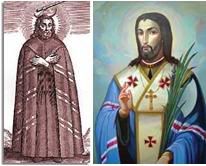 St. Josaphat (b Lithuania 1584, d Russia, 1623
St. Josaphat (b Lithuania 1584, d Russia, 1623
Bishop and Martyr, Patron Saint of the Ukraine
Born around the time that the Church of Ruthenia split, with some
Orthodox returning to communion with Rome (Uniates), he grew up
a Uniate, with a reputation for holiness even as a boy. He became
a Basilian priest, well-schooled and ardent in preaching the Catholic
faith. After heading many monasteries, he became Bishop of Vitebsk
at age 38. His preaching converted many orthodox to Catholicism,
including Ignatius, Patriarch of Moscow, and a descendant of the
Paleologue emperors. He was murdered by a mob in Vitebsk who
supported a dissident hierarchy that had developed against him.
Lying in state, his body had the odor of sanctity and was incorrupt
when it was exhumed five years later. His remains were later taken
to Rome where he is buried in St. Peter's Basilica. Hos body was
exposed intact in 1797. In 1867, he became the first Eastern saint
to be canonized in the Latin rite.
OR today.
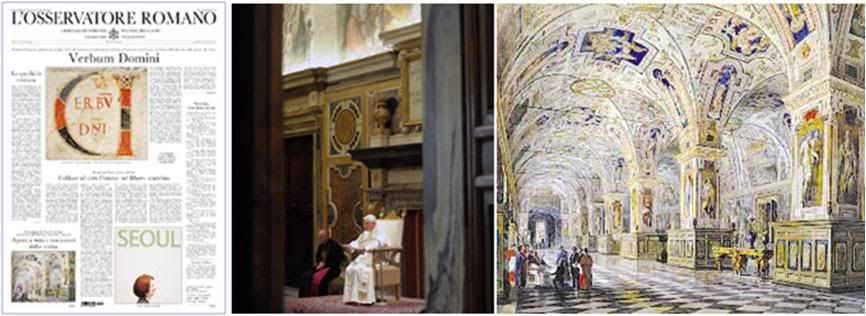 The lead story is obviously Benedict XVI's new Apostolic Exhortation Verbum Domini, whose Italian version the OR provides with this issue as a free supplement. An editorial links the Exhortation to the Pope's message on the reopening of the Vatican Library to the public; also highlighted is the third papal document from yesterday on the 2012 International Eucharistic Congress in Dublin. The only international news item on Page is that Pres. Obama fails to get South Korea to sign on to a proposed free trade agreement with the USA. In the inside pages, a report on Cardinal Bagnasco's news conference following the autumn general assembly of the Italian bishops' conference.
THE POPE'S DAY
The lead story is obviously Benedict XVI's new Apostolic Exhortation Verbum Domini, whose Italian version the OR provides with this issue as a free supplement. An editorial links the Exhortation to the Pope's message on the reopening of the Vatican Library to the public; also highlighted is the third papal document from yesterday on the 2012 International Eucharistic Congress in Dublin. The only international news item on Page is that Pres. Obama fails to get South Korea to sign on to a proposed free trade agreement with the USA. In the inside pages, a report on Cardinal Bagnasco's news conference following the autumn general assembly of the Italian bishops' conference.
THE POPE'S DAY
The Holy Father met today with
- All the heads of the dicasteries and organisms of the Roman Curia.
- Cardinal William Levada, Prefect of the Congregation for the Doctrine of the Faith (weekly meeting).
The Vatican has issued a communique explaining the process for the Apostolic Visitations to be carried out in Ireland
in connection with how some dioceses, religious orders and seminaries dealt with sex abuses committed by priests.
The visitations were ordered by Benedict XVI in his pastoral letter to the Catholics of Ireland last March.
[Modificato da TERESA BENEDETTA 12/11/2010 15:08] |
| |
 12/11/2010 13:20 12/11/2010 13:20 |
|
| | | OFFLINE | | Post: 21.423
Post: 4.059 | Registrato il: 28/08/2005
Registrato il: 20/01/2009 | Administratore | Utente Master | |
|
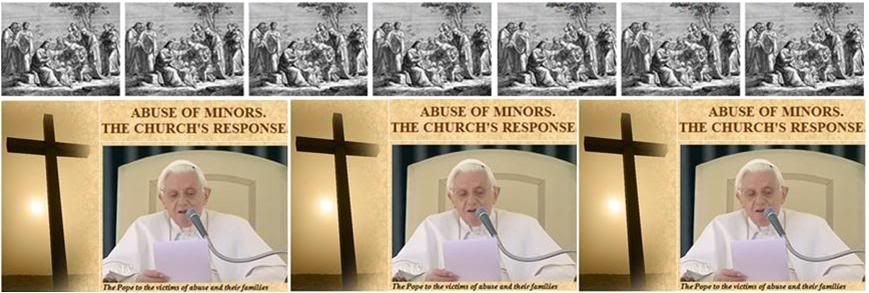 Apostolic Visitations in Ireland
Apostolic Visitations in Ireland
get under way:
The Vatican explains the process
 NB: The original document is in English.
NB: The original document is in English.
PRESS RELEASE OF THE HOLY SEE
AT THE BEGINNING OF THE APOSTOLIC VISITATIONS IN IRELAND
 On March 19, 2010, following a meeting with the Bishops of Ireland, His Holiness Pope Benedict XVI issued a Pastoral Letter to the Catholics in Ireland.
On March 19, 2010, following a meeting with the Bishops of Ireland, His Holiness Pope Benedict XVI issued a Pastoral Letter to the Catholics in Ireland.
The Letter expressed his deep sorrow and regret regarding abuse perpetrated by priests and religious and the way in which such cases had been responded to in the past.
It also called for an Apostolic Visitation of certain dioceses in Ireland, as well as seminaries and religious congregations. "Pastoral in nature, the Visitation ‘is intended to assist the local Church on her path of renewal’ (Pastoral Letter of Pope Benedict XVI to the Catholics of Ireland) and is a sign of the Holy Father’s desire, as the Successor of Peter, to offer his pastoral solicitude to the Church in Ireland (Vatican Press Release, October 6, 2010.)
In the months following the publication of the letter, preparatory meetings were held with the appointed Visitators, representatives from the Holy See, the Irish Episcopate and the Conference of Religious Superiors of Ireland (CORI) in order to lay out a clear plan for the Visitation.
The Visitation will identify whether the mutual relationship of the various components of the local Church, seminaries and religious communities is now in place, in order to sustain them on the path of profound spiritual renewal already being pursued by the Church in Ireland.
It also has the goal of verifying the effectiveness of the present processes used in responding to cases of abuse and of the current forms of assistance provided to the victims.
It will not be an investigation into individual cases of abuse nor a trial to judge past events. The Visitators will have to identify the explicit problems which may require some assistance from the Holy See.
The Visitation will in no way interfere with the ordinary activity of local magistrates, nor with the activity of the Commissions of Investigation established by the Irish Parliament nor with the work of any legislative authority, which has competence in the area of prevention of abuse of minors.
The Visitation does not seek to replace the legitimate authority of the local Bishops or Religious Superiors, who maintain responsibility in the handling of cases of abuse.
It is important to remember that the Visitators are not expected to receive allegations of new or old cases of abuse. If any were to arise, such allegations must be reported to the respective Ordinaries or Major Superiors who have the duty to inform the competent civil and ecclesiastical authorities, in conformity with the current civil and ecclesiastical laws.
Regarding the Visitation of
the Four Metropolitan Archdioceses
As previously announced, the Visitators of the four Irish Metropolitan Archdioceses will be: His Eminence Cardinal Cormac Murphy-O’Connor for Armagh; His Eminence Seán P. O’Malley, O.F.M. Cap. for Dublin; the Most Reverend Thomas C. Collins for Cashel and Emly; the Most Reverend Terrence T. Prendergast, S.J. for Tuam. The Visitators may bring with them some people, approved by the Congregation for Bishops, who can serve as assistants.
In respect of and in conformity with local civil law, the Visitators will make themselves available to meet with those who have been deeply wounded by abuse and who wish to be met and heard, beginning with the victims themselves and their families.
They will be received in the same fatherly manner in which the Holy Father, Pope Benedict XVI, has on several occasions greeted and listened to those who have suffered the terrible crime of abuse.
The Visitators will monitor how well the guidelines of Safeguarding Children, Standards and Guidance Document for the Catholic Church in Ireland, commissioned and produced in February 2009 by the National Board for Safeguarding Children in the Catholic Church, are functioning and how they may be better implemented and improved.
The Visitators may also meet with the other Bishops of the Province, and they should listen to, besides the local Ordinary, the Vicar General, the Episcopal Vicars, the Judges of the Ecclesiastical Tribunal, the Chancellor and other officials of the Curia, members of the Presbyteral Councils, members of the College of Consultors and of Pastoral Councils and, above all, those responsible for the Office of Protection and Prevention of Abuse at the diocesan and parish level.
Finally, Pastors and other priests, the lay faithful and individual men and women who wish to be received by the visiting Prelates may request this in writing. The Visitators will meet people individually or as a family.
If possible, it is recommended that each Archdiocese, embracing the penitential sentiments expressed by the Holy Father in his Letter, organize a Penitential service or some other similar gathering in the presence of the Visitator with the approval of the local Ordinary.
This will correspond with the penitential activities already promoted by the Irish Episcopal Conference, which include prayer, fasting and almsgiving.
With the aim of ensuring confidentiality, all those who wish to write to the Visitators should address letters to them by name using the mailing address of the Apostolic Nunciature.
In order to facilitate access for those who would like to meet with them, the address of the respective Visitator will be communicated by the Archdiocese. In coordination with each Visitator, their availability, the days they are already occupied and those still available for meetings with various people will be communicated.
Regarding the Visitation
to the Irish Seminaries
The Apostolic Visitator for the Irish Seminaries is the Most Reverend Timothy M. Dolan, Archbishop of New York. He will be assisted by some clerics, approved by the Congregation for Catholic Education, whose main duty will be to help to conduct the one-to-one interviews with the seminarians.
Archbishop Dolan will visit 5 institutions: St. Patrick’s College, Maynooth; the Pontifical Irish College, Rome; Saint Malachy’s College, Belfast; All Hallows College, Dublin; Milltown Institute of Theology and Philosophy, Dublin (this will be visited only in regard to its academic programmes).
Prior to each Visitation, the Visitator will receive copies of all necessary documentation. Moreover, each staff member and student will be granted the possibility to express to the Visitator in a signed statement his opinion about the seminary. Such letters should be addressed to the Visitator using the mailing address of the Apostolic Nunciature.
The Visitator will examine all aspects of priestly formation. He, or his assistants, will conduct private interviews with all staff members, all seminarians and, where applicable, other parties normally involved in the life of the seminary.
It is not his task to meet with victims of abuse who, as noted above, may be instead received by the Visitators of the four Metropolitan Archdioceses. Furthermore, each priest who has graduated from the seminary in the previous three years will be given the opportunity for a private interview.
In conducting his examination of each institution, the Visitator will follow the directives set out by the documents of the Holy See and of the local Church concerning priestly formation and the protection of minors.
Regarding the Visitation
to Religious Houses
Sr. Sharon Holland, I.H.M., Fr. Robert Maloney, C.M., Sister Máirin McDonagh, R.J.M. and Fr. Gero McLoughlin, S.J. have been appointed to serve as Apostolic Visitators of those Institutes of Consecrated Life and Societies of Apostolic Life with houses in Ireland.
The first phase of this Visitation will consist in responding to a Questionnaire which seeks information regarding the involvement of Institutes in cases of abuse, the responses offered to victims, and the compliance of the Institute with the protocols contained in Safeguarding Children, Standards and Guidance Document for the Catholic Church in Ireland.
The Questionnaire also seeks to ascertain how each community is dealing with the revelations and their consequences. Additionally it asks what is being done, in the light of past experiences, to assist members in their primary mission of radically witnessing to Christ's presence in the world.
The Visitators will meet afterwards to assess the responses to the Questionnaire. They will then make recommendations to the Congregation for Institutes of Consecrated Life and Societies of Apostolic Life regarding the next steps to be taken in the Visitation process.
When the Apostolic Visitation is complete, the Visitators will submit their findings to the Congregation for Institutes of Consecrated Life and Societies of Apostolic Life. After having carefully studied the Report of the Visitators, the Congregation will determine what further steps should be taken to contribute to a revitalization of consecrated life in Ireland.
Conclusion
Given the delicate nature of the subject matter and out of respect for persons involved, the Visitators will exercise great discretion and will not grant interviews during the first phase of the Visitation.
The Congregations for Bishops, for Institutes of Consecrated Life and for Catholic Education concur with the Secretariat of State that the first phase of the Visitation - the inquiry concerning the four Metropolitan Archdioceses, Religious Houses and Seminaries - should be completed if possible by next Easter 2011.
At that time the Visitators should submit the results of their enquiries so that they can be studied during the month of May and a plan for moving forward can be discussed. Then the Holy See will announce, with a proper Statement, the next steps that have to be taken.
When the Visitation is complete, the Holy See, after reviewing all the material submitted by the Visitators and offering suggestions for the spiritual renewal of the Archdioceses, Seminaries and Religious Houses, will issue a comprehensive summary of the results of the Visitation.

Expect the usual Pavlov-dog-with-tongue-hanging-out reflexive responses from the victimhood advocates and assorted Church critics - who will get more play in the news reports about this announcement than the announcement itself!
[Modificato da TERESA BENEDETTA 15/11/2010 16:44] |
| |
|
|
|
|